Annual conference Debates and decisions on the big education issues. See page 14.
Allergy advice What to do in an emergency. See page 25.
Pregnancy loss Support and advice for members. See page 29.
May/June 2024
Your magazine from the National Education Union

Summer tour dates
Look out for our free school meals van near you
You work hard to take care of their future. Let us take care of yours.
As an education professional, you know the importance of planning to get the right results. But did you know the same principle applies to your finances?
We can help you to:
Take control of your money.
Achieve a comfortable retirement.
Make the most of your savings.

Book your FREE financial consultation
Scan the code and submit a short enquiry form to claim your free initial consultation.

Q24_0211/April 2024 Approver Quilter Financial Services Limited & Quilter Mortgage Planning Limited. 4 March 2024.
May/June 2024
Photo by Rehan Jamil rehanwjamil

NEU
Editor Max Watson
Editorial assistant Frankie Faccion
Journalists
Sally Gillen, Emily Jenkins & Sarah Thompson
Newsdesk
t: 020 7380 4760
e: educate@neu.org.uk
Design & subbing Amanda Ellis
neu.org.uk facebook.com/ nationaleducationunion twitter.com/NEUnion
TO ADVERTISE IN EDUCATE
Display adverts
t: 020 7880 7614
e: educate-magazine@redactive.co.uk
Recruitment adverts
t: 020 7880 8542
e: educate-jobs@redactive.co.uk Except
WELCOME to this issue of Educate. I hope you had a restful Easter break – and for those who attended annual conference, I hope you enjoyed the four days of debate in Bournemouth.
This issue reports on the beating heart of the union, the event where decisions are made – annual delegates’ conference (see pages 14-19).
The NEU is a member-led union. If you want a say in the central debates of the day – whether it’s the outcome of the pay and funding indicative ballot (see page 7) or other pressing issues like workload and Ofsted – then go to conference.
Remembering Srebrenica (see page 37) had a stall and hosted a fringe meeting at conference, as did our Maternity Matters campaign (see page 29).
And at our Activist Zone workshop on winning local disputes, members discussed many of the heroic local strikes taking place, as we report on pages 8-9.
If you would like to get involved and come to conference next year, speak to your workplace rep or branch secretary about how you could play your part.
As a parent, the story of five-year-old Benedict Blythe – who died suddenly after he had an allergic reaction to a snack he ate at school – is haunting. Educate spoke to his mother (see page 25), and for members who feel ill-quipped to manage the risks around pupils’ allergies, we have provided signposting to advice and support.
Sometimes I receive letters from members disagreeing with the stance of a story included in the magazine. It is at conference where the union decides its position on issues, so if you feel strongly about something, please get involved to have your say.
You may notice something different about your copy of the magazine. We have switched to a new printer that uses 100 per cent recycled paper, which is made from UK household waste. This magazine is printed on paper made from your old cereal boxes and junk mail, directly from your council recycling centre, making it the greenest magazine in the trade union movement.
And, by switching to a new printer, we are proud to have reduced our carbon footprint too. We will explain how in a report next issue.
All the regulars are here, including a cartoon from Tim Sanders and commentary from Warwick Mansell, plus your photos, pets and puzzles.
As always, let me know what you think – email me at educate@neu.org.uk
Max Watson Editor, Educate

Welcome Educate
NEU Northern Ireland member, Charlotte Carson, in the free school meals van at annual conference in Bournemouth.
educate Your magazine from the National Education Union (NEU) 3 Your magazine from the National Education Union Allergy advice What to do in an emergency. See page 25. Pregnancy loss Support and advice for members. See page 29. Annual conference Debates and decisions on the big education issues. See page 14. May/June 2024 Summer tour dates Look out for our free school meals van near you
where the NEU has formally negotiated agreements with companies as part of its services to members, inclusion of an advertisement in Educate does not imply any form of recommendation. While every effort is made to ensure the reliability of advertisers, the NEU cannot accept any liability for the quality of goods or services offered. Educate is printed by Swan Print Ltd. Inside pages are printed on paper comprised of 100% recycled, post-consumer waste.
NEU president Emma Rose
general secretary Daniel Kebede

The HMT Empire Windrush arrives at the Port of Tilbury in Essex. It brings 1,027 passengers from Jamaica to London, around 800 of whom are from the West Indies. The ship becomes an emblem of the Commonwealth citizens, often referred to as the Windrush Generation, who came to Britain between 1948 and 1971 and drove the post-war economy.
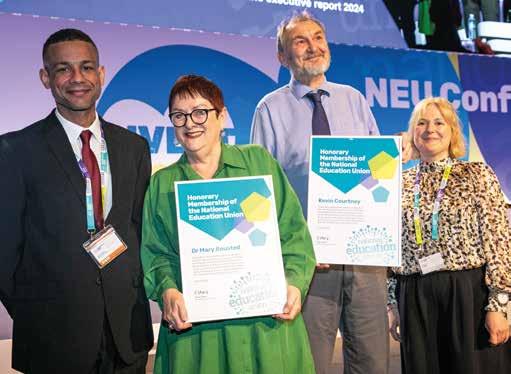

or
Pregnancy loss Avalanche of members’ “horror stories” led to union’s new Maternity Matters guidance (below left).
Get ’em while they’re young Registering the next generation of voting citizens (below).


Contents Regulars 21 Michael Rosen 33 Tim Sanders & Warwick Mansell 34 Ask the union 35 A class act 37 International 38 Jon Biddle & reviews 40 Teacher’s pet & letters 43 Noticeboard 47 Photo opportunity 48 Quick & prize crosswords 50 Final word News 6-7 News Indicative pay ballot result puts Government on notice. 8-9 Winning local disputes TPS victories at independent schools; Bulwell; St Ursula’s. 12 News in brief Gaza appeal, TUC women’s conference, early years crisis, Black LGBT+ conference. 13 Bigger picture Supply teachers protest rip-off agencies. 14-19 Conference Debates and votes on issues that steer the union. 22 Union people Meet the NEU’s 2024 award winners. The
history
rest is
21 June 1948
educate Your magazine from the National Education Union (NEU) 5 Features 25
29
Pregnancy loss For women and parents experiencing pregnancy loss including ectopic or molar pregnancy, miscarriage, termination/abortion, stillbirth or neonatal death, we call for: Compassion understanding and reassurance if we experience a baby loss Dignity appropriate washing and toilet facilities at work Respect for our choices, our language to describe our experience Privacy protect our right to share or not to disclose our trauma Time support and time to grieve, to heal, to recover Kevin and Mary awarded honorary membership at annual conference. p14-19 14 29 30
Extreme allergy advice In a life
death situation would you know what to do?
30
PHOTO by Kois
25
Miah
Leadership convention
LEADERSHIP members gathered for their annual convention in London on 8 March, where they heard from inspiring speakers, attended workshops and shared their experiences of leading in the current climate.
Keynote speaker Viv Grant, a former school leader who now coaches head teachers, told the conference that educators have been struggling in an “educational swampland” under a Conservative government for the past 14 years: “We haven’t been able to fly. We haven’t been able to truly let our young people fly. It’s as though we are waiting for a General Election and things to change.”
NEU national executive member, education trainer and former primary head Siobhan Collingwood addressed Ofsted: “Chief inspector Martyn Oliver is making all the right noises, but if you smile when you’re kicking us, you’re still kicking us. Until the forced academisation agenda and the publication of results is addressed, they are still going to be kicking us, no matter how hard they smile.”
Ofsted risk assessment
THE NEU has published a new Ofsted risk assessment. It is designed to help employers, in consultation with union reps, assess the extent of harm that is caused by the Ofsted process and take practical steps to reduce risks.
According to the Government’s latest health and safety statistics, the education sector has higher than average rates of work-related stress, depression or anxiety. A recent NEU poll also revealed that pupils reported feeling belittled and in tears following meetings with inspectors.
n Visit neu.org.uk/ofsted-risk-assessment-guide
Manifesto calls for SATs reform EDUCATION charity More Than A Score is asking school leaders to sign its new petition – SATs: Manifesto for Change.
Developed in consultation with school leaders, the NEU and other education experts, the manifesto calls for an independent review to consider substantial reform of primary assessment and accountability, with SATs paused in the meantime.
n Visit morethanascore.org.uk/school-leaders

THIS summer term, the Free School Meals for All campaign is going on tour. NEU campaigners will be travelling the country in our trusty blue van, visiting schools across the nation and spreading the message about the difference a hot, healthy, free lunch can make to children, parents and their communities.
The NEU would love you to get involved. Whether it’s getting your school signed up to our open letter, your class writing to your local MP or even hosting a community lunch with parents and carers, there are plenty of ways for you to add your voice to our call to make sure every child in England’s primary schools has access to a free school meal.
n Scan the QR code (right) or visit bit.ly/schooltourdigitalpack

NI unions win 24% rise in teacher
NORTHERN Ireland’s teachers and school leaders have voted to accept a pay offer that will see teachers’ starting salaries rise by 24.4 per cent.
After a long-running joint campaign by five education unions (NEU, INTO, NAHT, NASUWT and UTU), which have been taking industrial action since October 2022, members voted in March to accept a new pay offer by the Department of Education NI.
The settlement will result in the starting salary for teachers in Northern Ireland rising to £30,000, bringing it in line with the starting salary for teachers in England. Teachers backed the offer by 89 per cent in a
consultative ballot, on a turnout of 75 per cent.
Pauline Buchanan, NEU joint regional secretary, said: “It is finally being recognised that we face a recruitment and retention crisis in teaching. There is a shortfall in funding and resources in education generally, and teachers often dip into their own pockets to provide resources for their pupils.”
The new pay agreement also establishes an increase of one per cent from September 2021, five per cent in September 2022 and an increase of 4.1 per cent plus a consolidated £1,000 in September 2023 for teachers and school leaders on all other points.
educate Your magazine from the National Education Union (NEU) 6 News
PHOTO by Rehan Jamil
NEU teachers vote Yes
More than 150,000 NEU teacher members – just over 50 per cent – voted in a preliminary ballot on pay and funding, and over 90 per cent said Yes to strike action.
‘Solve this crisis or face further strikes’
THE union has presented Education Secretary Gillian Keegan with a stark choice: give teachers in England a fully funded, above-inflation pay rise and boost funding for extra staff, or face more strikes.
The warning was issued by NEU general secretary Daniel Kebede in a letter to Keegan requesting an urgent meeting, after 90 per cent of members who voted in the union’s indicative ballot said they were prepared to strike if they aren’t given a decent pay rise this year.
Eight days of strike action by NEU members last year forced the Government to increase its original three per cent offer to 6.5 per cent.
‘Only if you give us no choice’
Highlighting the indicative ballot result, Daniel called on Keegan to intervene urgently.
“Our members are prepared to take further industrial action to ensure teachers and our schools get the fair deal they deserve, but only if you give them no choice,” he said.
Daniel wrote to Keegan after presenting the union’s oral evidence to the School Teachers’ Review Body on 16 April, setting out the need for an award that constitutes
starting salary
Edel McInerney, president of NEU Northern Ireland, said: “Overall, the collaboration among teaching unions showcases the strength and effectiveness of collective action.
“We were conscious that a major leap was required to retain teaching as a good graduate profession. We are glad that the focus can now be where it belongs – on the pupils in our schools.”
Teachers’ pay awards in Northern Ireland are agreed through collective bargaining at the Teachers’ Negotiating Committee (TNC), which comprises representatives from the teachers’ employers, sectoral interests, Department of Education and the five unions.
n To find out more about how the settlement will affect your pay, visit neu.org.uk/NI-pay-FAQs
“If this – or any Government that comes after it – doesn’t take action, we will.”
a meaningful step towards a long-term correction in pay. Teachers’ testimonies on the impact of real-terms pay cuts over many years were included in the NEU’s evidence.
£79,000 real-terms
pay lost
Analysis by the NEU found the average teacher has lost, in real terms, more than £79,000 in pay since 2010. Figures published by surveying app Teacher Tapp show a 42 per cent increase in the numbers of teachers taking second jobs.
In his letter, Daniel reminded Keegan that NEU members never take strike action lightly, and that they would always rather be in the classroom. “However, the result of the preliminary ballot demonstrates the depth and strength of feeling of NEU members – a
sentiment that was echoed at our annual conference,” he added.
At this year’s conference in Bournemouth, held a week after the ballot closed, members passed a motion to use the ballot result to serve notice on Prime Minister Rishi Sunak and Labour Party leader Keir Starmer that members are prepared to act industrially if they fail to deliver.
Threatening to destroy education
Commenting after the motion was passed, Daniel said: “Every school leader, every teacher and every parent wants solutions to the crisis facing education. The Government needs to take action to solve the crisis that is threatening to destroy education. But if it – or any Government that comes after it – does not, we will.”
A preliminary ballot of support staff members also returned a resounding Yes vote for action, agreeing to join forces with other recognised unions to back an aboveinflation pay claim of £3,000 or 10 per cent, whichever is greater, and to demand Government commits further funding to improve staffing levels.
n The union’s executive will discuss plans for further action at its meeting in May.

educate Your magazine from the National Education Union (NEU) 7
Striking teachers in Belfast
PHOTO by Brian Morrison
TPS victories in more than News
St Ursula’s members ready to strike as they await rep verdict
TEACHERS have balloted to take more strike action if their suspended rep is not reinstated, following an independent investigation into claims he had bullied pupils.
Alex Turpie, who has taught at St Ursula’s Convent School in Greenwich for 22 years and been a rep there for 15, was suspended last September.
It followed a parent’s complaint that he had shouted at their child. A first investigation into the complaint was carried out by a member of staff, who failed to speak to any children in the class at the time of the alleged incident.
NEU members have taken eight days of strike action in support of Alex, who they believe is being targeted following a successful campaign at the school to fight academisation plans in 2022.
NEU regional officer Michael Gavan, who accompanied Alex to a second investigation meeting in March, said it was now hoped he would be vindicated and return to school.
Michael told Educate: “This second, impartial investigation has only come about because of resolute strike action by our members at St Ursula’s. While Alex and our members now expect a finding of no case to answer, they are prepared to keep up the pressure on school management and governors.”
STAFF at independent schools are continuing to fight off attacks on the Teachers’ Pension Scheme (TPS) by employers that are claiming it is unaffordable.
In April, the employer contribution increased from 23.6 per cent to 28.6. This led many schools to try and exit the TPS or cut teacher pay to cover the hike. The latest figures show that more than a quarter of independent schools in England and Wales have exited the scheme or have begun a phased withdrawal.
But NEU members are fighting back, and in schools with a strong union group, they are winning. Staff in more than 80 independent schools have managed to hold on to the TPS by taking collective action.
Strike threat holds off UL’s plans
In several cases, the threat of strike action was all it took to force an employer’s hand.
In March, 13 independent schools run by United Learning abandoned plans to cut teachers’ salaries to pay the increased employer contribution to the TPS after 93 per cent of NEU members voted Yes to strike action. United Learning is a multiacademy trust which runs more than 90 schools across the country. Following the ballot, the schools committed to pay its contribution in full and keep the TPS open to new staff.

“Never has being part of a union felt more important or rewarding.”
100% of members vote Yes to action
In February, governors at Haberdashers’ Girls’ and Boys’ schools in Hertfordshire announced their intention to cap their contribution to the TPS. This was followed by the threat of fire and rehire – whereby the employer imposes inferior contracts on staff by sacking them, and then immediately rehiring them – to force the change through.
“It is the certainty of the TPS and, essentially, the safety of it that means teachers put up with long hours, ridiculously stressful working patterns, constant scrutiny and feeling like our profession is a political football,” said Lou Wallace, NEU rep at Haberdashers’ Girls’ School.
Staff quickly united in opposition. NEU membership across the schools increased by a third, and all members voted Yes to strike action. Governors retracted their proposals and agreed to pay the increased contributions to the TPS.
Lou and her fellow reps, Richard Shopland and Emma Nairne, said: “This is a huge achievement, but perhaps even more heartening than the knowledge our pensions are safe, is knowing that our collective potential was realised. Never has being a member of a union felt more important or more rewarding.”
‘Didn’t understand importance of TPS’ At nearby Aldenham School, members are also celebrating after the school dropped plans to cap its contribution to the TPS following a staff survey, which showed there would be strong support for a strike ballot.
“I don’t think the school had fully understood the importance of the TPS to staff at all stages of their career, and the strength of feeling among them,” said NEU rep Fiona Mepham. “It is an enormous relief that we will continue with a fully funded TPS, but we are waiting to hear how this might affect future pay increases. This dispute has grown our NEU membership and pulled us together
educate Your magazine from the National Education Union (NEU) 8
Joint NEU reps Richard Shopland, Emma Nairne and Lou Wallace at Haberdashers’ Girls’ School
Workplace reps, conference motion 30
The NEU committed to producing rep guidance on collectivising issues, running disputes and balloting in schools. See page 14
80 schools
as a staff body, enabling open discussion about pay and pensions.”
‘The power of unity and determination’
Following a successful ballot campaign at Birkenhead School in Merseyside, the employer withdrew its proposal to cap the contribution to the TPS at its current level until September and then force all staff into an Aviva pension scheme.
Bora Oktas, NEU North West regional officer, said: “Our victory exemplifies the power of unity and determination.”
Withdrawal from pension dropped
Members at King’s School in Macclesfield have also, through a strong mandate for strike action, persuaded the employer to stay in the TPS and commit to paying the employer contribution in full, as well as auto-enrolling new staff into the TPS.
Sarah Vaughan, Cheshire branch secretary, said the positive outcome was a result of members’ collective resolve: “The solidarity shown by each member has undoubtedly influenced the employer’s willingness to address the concerns raised.”
n There are several ongoing TPS campaigns at other independent schools, including at St Mary’s in Ascot and Cathedral in Cardiff.

All demands met after strike action
“Staff are delighted with the speed at which they have claimed back their school.”

TEACHERS and support staff members are celebrating a victory at Bulwell Academy in Nottingham, following nine days of strike action in the spring term.
The action at the secondary school was in response to a number of serious concerns, including the “inappropriate and unprofessional conduct” of the new head teacher.
NEU rep Nicola Beresford said: “Members felt undervalued, vulnerable and disrespected. Several staff were put on gardening leave or released early from contracts, and there was a spike in absences linked to work-related stress.”
The NEU worked alongside sister unions to co-ordinate a campaign that included meetings with Alex Norris MP and members of the local community. “This led to parents and members of the public joining us on the picket line and increased pressure being put on the trust to take our demands seriously,” said Nicola.
All of their demands were met, including a 13-point workload reduction plan, and the head moved on. Strike action was called off by the end of February.
“Staff are delighted with the speed at which they have claimed back their school. No longer is there an atmosphere of fear and distrust. Staff feel safe and valued in the workplace and things are steadily improving,” said Nicola.
educate Your magazine from the National Education Union (NEU) 9
The picket line at Bulwell Academy
NEU members on the picket line at St Mary’s School in Ascot












GET READY TO CELEBRATE MARMALADE DAY BOOK NOW www.paddingtonbearexperience.com/schools COUNTY HALL, LONDON SOUTHBANK OPENING MAY 2024 ©P&Co. Ltd./SC 2024
Protecting young people from online harm

NEU general secretary Daniel Kebede pledges to campaign against the terrifying rise of online misogyny and its impact on women and girls in our schools and colleges.
OUR conference over the Easter break was truly inspiring.
I spent five days talking and listening to some of our best activists about the issues facing members and pupils in schools and colleges accross the land.
People who work incredibly hard in the interests of their colleagues, children and their communities.
Officers, reps and members who put in countless hours to build our recent indicative ballot. Who campaign for better assessment and an alternative to Ofsted, one that is supportive, effective and fair.
Who challenge the scourge of child poverty and its devastating effect on young lives.
Activists who challenge racism, bigotry, homophobia and misogyny to make the world a better place for their pupils.
Onslaught of harmful views online
I am immensely proud to lead our growing union, the third largest in the TUC and the largest education union in Europe.
A union that is truly representative of the profession – young and female.
And, leading a union of 76 per cent female members, I feel it is my duty to speak out about an issue that is scarring a generation. I’m referring to the terrifying rise of online misogyny and pornography that’s readily available to our children.
It’s an inescapable fact that young people are facing an onslaught of harmful views online. Misogynist influencers such as Andrew Tate have got a foothold in the minds of a cohort of young men. A recent survey by King’s College London’s Policy Institute and Global Institute for Women’s Leadership of 16- to 29-year-olds found they held more negative views about feminism than those aged over 60.
Couple this with the deteriorating mental health of our young people since 2010,



and soaring levels of depression, anxiety, selfharm and suicide.
The development of social media and online forums have contributed to this –Facebook, X (formerly Twitter), Instagram, TikTok, Snapchat.
Who can argue that easily accessible pornography is not distorting young people’s views of sex, sexuality and their relationships? Or that the internet is not behind the rise in misogyny, racism and misinformation?
Views expressed online are jumping from our screens to our classrooms. The NEU’s own groundbreaking research found that sexual harassment was rife in schools.
Our It’s just everywhere report found that over a third of girls at mixed-sex schools had experienced some form of sexual
harassment at school. And almost a quarter had been subjected to unwanted touching of a sexual nature while at school.
What happens in the virtual world has a lasting impact on girls and women in real life. That’s why it is important we campaign on this issue.
Reform to social media regulation
The Government has proposed an Online Safety Act intended to stop children from accessing illegal, harmful and ageinappropriate content. It’s a start, but it doesn’t go far enough. Social media giants should be required to have much greater social responsibility to children and young people.
We need a Parliamentary Commission, as a precursor to ambitious reform to the way social media is regulated.
It took decades for tobacco advertising to be banned. Like the tobacco giants, the social media companies are very rich and very powerful. These corporations, driven by profit and acquiring a greater market through more clicks, have created a digital empire that exploits the complexity and uncertainty of the teenage years. This rests on harvesting more and more data and attention, for profit, at the expense of children and young people’s welfare.
As a father, a teacher and a trade unionist, this is something that really matters to me and it should matter to all of us.
And it’s an issue I pledge to make a central part of my tenure as leader of this union to bring about a real improvement for our pupils.
n For more information on how the NEU is tackling sexual harassment and the normalisation of sexist attitudes, visit neu.org.uk/not-ok
educate Your magazine from the National Education Union (NEU) 11 Opinion
It’s Not OK: It’s Not OK: sexism and sexual harassment must stop This school says NEU2712/0922 neu.org.uk/end-sexism-sexual-harassment Scan here for more information
Delegates at this year’s conference, speaking on the Anti-sexism and the rise of online misogyny motion.
See page 14
PHOTOS by Kois Miah
News in brief
Air filters in capital’s schools
LONDON Mayor Sadiq Khan has announced that 200 schools in London’s most polluted areas will have air filters installed in every classroom later this year, as part of a pilot project.
68% of EY providers already full MOST early years providers in England expect to struggle to meet the demand for new places under the Government’s extended childcare entitlement offers, the Early Years Alliance has found.
In the spring budget of 2023, the Chancellor announced that 30 hours of free childcare a week would be extended to working parents of all children over the age of nine months and under the age of five. A phased rollout of the scheme began in April.
However, 68 per cent of 1,196 early years providers in England, surveyed in January and February this year, said they are already at full capacity. Twentyfour per cent believe it is likely or very likely that their setting will close over the next 12 months.
Download our measles poster TO raise awareness of the rise in measles cases, the NEU has produced a downloadable poster. This is part of a campaign in England to encourage the uptake of the measles, mumps and rubella (MMR) vaccine.
Figures from NHS England show that more than 3.4 million children under the age of 16 years have not had the jab. Measles also poses a serious risk to pregnant women and those with a weak immune system.
n Download the poster at neu.org.uk/latest/ library/neu-measles-poster

“VIOLENCE
against women and girls is one of the world’s most prevalent human rights violations, taking place every day, many times over, in every corner of the globe,” said Máiréad Canavan.
Speaking at the Women’s Trade Union Congress (TUC) conference, which took place in London from 6-8 March, she was discussing a motion put forward by NEU members: Working with men and boys to end violence against women and girls.
“It is time we educated our boys and stopped just talking to women and girls about sexism, sexual harassment and violence,” said Máiréad, who is an
Gaza appeal hits £100,000
NEU members have raised more than £100,000 in aid of humanitarian work in Gaza. The funds will support Save the Children to deliver life-saving food, water, hygiene kits and medicine,

NEU national executive member for Wales, and one of a delegation of ten members who represented the NEU. Forty-six motions were debated, including Maternity Matters (the second motion put forward by the NEU); Women’s health and safety in the workplace; Childcare; Artificial intelligence and its risks to women; and Under-representation of women and sexual stereotyping in the arts.
alongside establishing child-friendly spaces, providing mental health and psychosocial support, and trying to ensure children can access education in some form.
n Visit justgiving.com/campaign/neu-gaza
THIS was my first foray into the supportive world of the Black LGBT+ NEU network. We gathered in Manchester on 8 March, bonded over food and danced our way to friendship on the legendary Canal Street. Sounds frivolous, perhaps, but when you are vulnerable to experiencing racism and homophobia, this bonding is incredibly empowering. Sharing and solidarity were the big themes during a weekend of wellbeing and activism. We were introduced to coaching, and all planned the next steps of our personal goals. We heard inspirational stories from experienced activists Hiten and Den, which left us in awe and newly motivated to fight for change.
By Rae Garvin, Tower Hamlets & the City NEU
by
educate Your magazine from the National Education Union (NEU) 12
Delegates including past and present NEU presidents, Louise Atkinson and Emma Rose
PHOTO
Jess Hurd
Bigger picture

THE NEU staged a protest outside the London offices of the UK’s largest supply agency on 20 March to highlight gross profiteering and exploitation of supply staff.
Members gathered in front of Teaching Personnel’s HQ and were joined by protest singer Steve White, whose song, Welcome to put up shut up Britain, was written specially for the event.
Supply teacher and NEU executive member Louise Lewis led chants of “fair pay for supply workers” and “stop the agency rip-off”.
Louise told the crowd: “We don’t want agencies. We want all educators to be valued, appreciated and paid to scale.”
While schools try to cope with the teacher shortage crisis, supply agencies are reaping the benefits, with soaring
profits. NEU research shows that the eight leading supply agencies had combined gross profits of £108.9 million in 2022 – an increase of 55 per cent on the previous year. Teaching Personnel alone reported gross profits of £32.3 million.
Supply staff are qualified and, often, very experienced teachers, yet the NEU’s 2023 supply staff survey found that some were receiving as little as £100 a day.
The NEU campaign is calling on the Government to regulate supply teachers’ pay and conditions, including giving them access to the Teachers’ Pension Scheme.
PHOTO by Kois Miah
educate Your magazine from the National Education Union (NEU) 13
Phil Child (centre), a West Midlands regional officer, and executive member and supply teacher Louise Lewis (far right), with fellow protestors

‘Develop confidence to be more active in your workplace’
FOR the last couple of years, a feature of conference has been the Activist Zone, hosting sessions for members to discuss and share their experiences.
Ed Lewis, national training manager for the NEU, helped to organise the Activist Zone. He told Educate: “It has been shaped by activists, who have led the sessions. It’s about developing people’s confidence and skills to be more active in their workplaces and in their districts, to organise members effectively.”
Sessions were held on a variety of issues – including workload, performance-related pay, equalities and special educational needs and disabilities (SEND).
“This year has been great,” said Ed. “It’s been really lively. We’ve had three days of really stimulating debate across a range of topics. We’ve just come out of a session now on how to build and win local disputes, which has been the best attended session of the zone. We had around 100 people here, talking about and demystifying the process of balloting locally.
“Many members here have been saying that they feel more confident, they realise that taking action locally isn’t something that they should be afraid of. That’s what the Activist Zone is all about.”
Change the world
Sally Gillen, Sarah Thompson and Max Watson report from this year’s NEU annual conference in Bournemouth.
Photos by Kois Miah
MORE than 1,400 members gathered in Bournemouth just after the Easter weekend to debate, network and vote to determine the policy of the NEU.
Delegates watched short films on the NEU’s Free School Meals for All campaign, Save the Children and a clip from Defiance (C4) about Blair Peach, an NUT member who was killed by the police on an anti-racist demonstration in 1979.
Big debates were held, on subjects from pay to Ofsted, from sexism to assessment. We bring you a flavour of what was discussed (see page 7 for the outcome of the vote on pay and funding).
Conference held two minutes’ silence for those members we have lost over the last year.
Misogyny, menopause and maternity Several debates were on issues directly impacting women and girls – 76 per cent of our members (and 58 per cent of delegates) are female.
Lucy Coleman, from Oxfordshire, moved motion 27 – Anti-sexism and the rise of online misogyny. “Every woman has



experienced misogyny in their lives,” she said. “Everyone has a tale to tell.” The internet and access to social media has made it easier for sexist views to be normalised, Lucy said. “It’s hard enough to grow up as a female in a maledominated world.”
The NEU has “brilliant resources” to tackle sexism with a “whole-school approach”, such as the It’s Not OK toolkit (neu.org.uk/not-ok). “As educators, we’re uniquely placed to challenge sexism. We need to ensure the great work that went into the toolkit is not wasted,” she said. The motion commits the union to making the toolkit more accessible and widely promoted, and calls on districts to share it with members and school leaders.




educate Your magazine from the National Education Union (NEU) 14
Conference news
through your union

Lorraine Metcalf, from Northumberland, called out online influencers and named Andrew Tate as a “real challenge” for educators promoting gender equality in schools (see page 11).
“Many boys look up to him,” Lorraine warned. “This is not OK. And he is not alone – he is the tip of the iceberg.”
Members passed a motion calling on the union to expand training for reps on perimenopause and menopause symptoms and workers’ rights; lobby for mandatory training for leaders; and push for a menopause policy to be mandatory in schools and colleges.
Karen Kemble, from Hounslow, said an analysis of cases handled in the west London branch found a disproportionate



number involved women aged 45-plus who needed support.
“This is no coincidence. The average age of women to experience menopause is 51, with perimenopause causing symptoms for women in their 40s,” said Karen, who won applause as she added: “I’m going to call this what it is: ageism, misogyny, discrimination.”
Proposing a motion calling on the union to boost its support and advice on maternity rights, including a dedicated maternity and pregnancy adviceline for members, Rosie Kelly-Smith, from Sutton, said: “We must force schools to give pregnant women their entitlements. In 2024, we, the NEU, must put our foot down and say: enough.”
Rosie has been heavily involved in setting up and running NEU Parents, an online forum that provides help and advice for members. She said she had come across many examples of unfair and discriminatory treatment, including head teachers refusing to make reasonable adjustments and women being denied pay progression while on maternity leave.
She said: “The list of injustices and maltreatment is long and enraging,” adding the largest group leaving teaching were women aged 30-39, who were victims of the “motherhood penalty”.
Local disputes & workplace reps Peppered throughout the four days of debate were stories of local disputes.
Reps in the Activist Zone (see page 14) heard there are more local strikes now than there ever have been for the NEU –for example, in Northern Ireland, where members won a 24.4 per cent increase this term after a long-standing dispute (see page 6).
Edel McInerney, president of



NEU Northern Ireland, called for pay parity across the UK, which she said was a “moral obligation”. She pointed out “glaring disparities” between teachers’ pay in England, Scotland, Wales and Northern Ireland.
The joint union campaign won a significant pay rise, but Edel said: “We are still the lowest paid in the UK. It breeds a sense of inequity and undermines our values.”
Conference passed a motion calling on the union to boost support and training for workplace reps to equip them with the skills to do casework, run successful ballots and negotiate facility time. The motion will also mean the union will now produce guidance for reps on collectivising issues and running disputes. Proposer David Davies, of Hackney NEU, described reps as the “lifeblood of our union”.
Seconding, Kathryn Norouzi, from Nottingham, a workplace rep for ten years and now lead rep at a multi-academy trust (MAT) of nine schools, said: “Reps have so much potential to support our members, build our union and make us even more effective than we have already been. They are part of everything we do as a union.”
Kathryn won applause as she reported that through the hard work of reps, her MAT had achieved a 78 per cent turnout in the indicative ballot in March. “Success and strength locally leads to success and strength nationally,” she said.
Workload, recruitment and retention
Anna Scott, from East Riding of Yorkshire, moved a major debate on motion 15: Workload – building a national campaign. Workload pressures overshadow the rewards of teaching, Anna said. The Government misses its teacher recruitment targets
continued on page 16



educate Your magazine from the National Education Union (NEU) 15
Conference news
Conference news
continued from page 15
year after year. “You don’t need to have taken maths until you were 18 to realise we are going to run out of teachers.
“Workload is the main issue. Power concedes nothing without a demand, and demands need action.”
The motion called for a campaign to highlight intolerable working conditions of staff, and a national contract, binding on all employers.
Tracey Taylor, a first-time delegate from Norfolk, said that during the pay campaign in 2023 many members asked her what the union was going to do about workload.
“It’s still the most common reason for teachers leaving the profession,” she said.
Melanie Cannon, from Luton, moved a motion noting the record number of unfilled teacher posts in 2023 and missed targets for trainee recruitment in primary and secondary education. Low pay, workload levels, lack of respect for the profession and the toxicity of Ofsted have had a “deadly impact” on teacher recruitment and retention, Melanie said.
“We give so much of our time and energy to our jobs because we love the children and want a better future for them. It is devastating that so many of us are leaving the profession. We’re on our knees. Something has to change.”
Shelagh Kavanagh, from Newmarket, said the recruitment crisis was leading schools to pay supply agencies for staff. “That money was for schools. Where is it now? Bobbing up and
Inhumane Ofsted: this has to stop
IN a moving address to conference, the sister of Ruth Perry urged members to unite and push for meaningful change to Ofsted, “an inhumane, unaccountable inspection system”.
Professor Julia Waters paid tribute to her younger sister, a dedicated head teacher, who took her own life in January 2023, two months after Ofsted graded her school Inadequate.

“Ruth felt everything she had stood for in her career and in her community had been destroyed in a moment by an unfair Ofsted decision,” said Julia, who has since become a tireless campaigner for Ofsted reform. This year she was named joint winner of the union’s Fred and Anne Jarvis award (see page 23).
In December 2023, coroner Heidi O’Connor concluded that Ofsted had contributed to Ruth’s death. Julia told conference: “I am worried that the people who could bring about real change might only be paying lip service to the lessons we must learn. I hope they learn, and learn quickly.”
“The Ofsted system of inspection is fatally flawed. It doesn’t serve parents, pupils or teachers. It must change.” She added that educators were “trapped” by the system, but said: “You don’t have to put up with it anymore.” Whatever their reservations, members should put their energy into campaigning for real change and start by making their voices heard through Ofsted’s Big Listen consultation.
Applause filled the packed auditorium, as she told conference: “The interests of children are not best served by stressed out, burnt out, anxious teachers and school leaders. It has to stop.”
down on a yacht in the Maldives. Agencies are not the solution to the recruitment and retention problem. They are adding to it –creaming off profits and cashing in on a crisis.”
Abolish Ofsted, scrap SATs
A motion calling for the union to continue its campaign to abolish (and replace) Ofsted was passed unanimously by conference. It
‘Your solidarity gives us the most precious thing – hope’

THANKING delegates for the opportunity to address conference, Dr Husam Zomlot, Palestinian ambassador to the UK, said the NEU’s solidarity with Palestine was no surprise: “You are teachers, and you all possess a clear moral clarity.”
Describing the catastrophic impact of the Israeli occupation on Palestine’s education system, he said: “Every single one of Gaza’s 12 universities and three quarters of school buildings have been partially or totally destroyed.
“The phrase ‘education, education, education’ is drilled into our minds from a young age. It has been a primary means by which the Palestinian people have been able to recover, survive and stay resilient in the face of repeated catastrophes.”
Gaza’s 625,000 children have been unable to access education for months. “We are facing a lost generation for whom education will be just a distant dream,” said Dr Zomlot.
He criticised the Government’s decision to stop funding the UN Relief and Works Agency (UNRWA), saying UNRWA’s priorities – education and health – made it a target. “An occupied people is so much easier to dominate if it is uneducated, unhealthy and unaware of its rights.”
Urging delegates to continue their support, he said: “Your solidarity reminds us that we are not alone, and that brings the most precious thing we have – hope. For the hope you give us, I thank you from the bottom of my heart.”
educate Your magazine from the National Education Union (NEU) 16
called on the union to support members balloting for strike action where ‘mocksteds’, deep dives and excessive workload have arisen through Ofsted pressure.
Moving the motion, Rochdale delegate David Barter said: “We know the damage Ofsted does to lives, but we also know that Ofsted does not contribute to school improvement and is flawed as a means of accountability.” He said schools needed a locally based, supportive system of accountability.
Describing Ofsted as “a menace to education”, Ian Walters, from Derby, said the fear it instilled was leading talented, dedicated professionals to leave the profession. Delegates shouted “shame” when he referred to Ofsted’s former chief inspector Amanda Spielman’s refusal to admit that Ofsted made errors in its handling of the inspection that contributed to the death of Ruth Perry (see page 16, opposite – Ruth’s sister Julia Waters’ speech).
Katie Gumbrell, from Reading, said: “I am done with Ofsted. After nearly 20 years in teaching, I can see no value added. All I see is pressure on school leaders and fear in staff.”
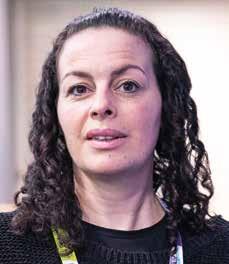
“I work in reception and to see early years so well represented at conference has been inspiring. There’s some really passionate people here.
“Conference gives you the motivation to go back and do more work with your members. I would definitely say give it a go.”
Eve Palliser, Bedfordshire first-time speaker
Moving the SATs – bad for children, time for change motion, Jennifer BhambriLyte, from North Somerset, asked: “When did data become more important than children?” The motion committed the union to continue building the More Than A Score campaign and to prioritise the assessment campaign.
Robert Brown, from Ealing, seconded the motion. He said: “Schools have become more and more focused on teaching to the test.” Robert cited examples of distressed year 6 pupils worried they wouldn’t get into their preferred secondary schools if they didn’t pass their SATs, and condemned the resulting stress, sleepless nights and panic attacks.
Palestine solidarity
Debs Gwynn, from Halton, moved a motion calling on the union to encourage districts to affiliate to the Palestinian Solidarity Campaign and support its Boycott, Divestment, Sanctions campaign (see page 16, opposite – Dr Husam Zomlot’s speech). Referring to Education Secretary Gillian Keegan’s comment that she was appalled the motion was being discussed, Debs said: “This union will take no lectures from Gillian Keegan and this racist Government on what is or isn’t appropriate. There is nothing in this motion that attacks Jewish people or the Jewish religion.”
Creativity in the curriculum
Sarah Kilpatrick, from Northumberland, moved the motion on creativity in the curriculum. “Michael Gove decimated arts funding in schools,” Sarah said, and there has since been “unprecedented Government interference in the curriculum”.
GCSE entries for arts subjects have fallen by 47 per cent since 2010, she said. “Arts have been stolen from those who could least afford to lose them.”
The motion calls for a sector-wide conversation on system reform in education. Ed Harlow, a music teacher from Haringey, said: “We don’t need another curriculum review, we need a curriculum revolution.”
Michaela Wilde, from Bristol, moved motion 14, on a national campaign for support staff pay and equal rights. She explained that a change in circumstances meant she had to give up her second job, which she has because she’s on a term-time-only contract. “Many of our members are struggling,” she said. “It’s time we launched a national campaign for support staff.”
Sheila Caffrey, also from Bristol, seconded the motion. “We need a serious campaign for pay and funding. We must fight for recognition. If you’re not at the table, you’re continued on page 18
On the fringe
MATERNITY MATTERS
Members discussed how to support pregnant women and new mothers. Sandra Igwe, founder of The Motherhood Group, shared her experiences of maternal health discrimination as a Black woman, and Carol Jumpp-Graham, from Middlesex, spoke about the obstacles facing mothers on return to work. Charlotte Ovey, from Devon, highlighted the NEU’s Maternity Matters guidance, saying: “Maternity impacts everyone within the union and workplace.”
WORKLOAD
Stefan Simms, district secretary of Ealing NEU, in west London, talked about a charter to help school leaders cut workload by six hours a week. “To my surprise, heads do not share good practice on workload with other schools,” he said. Schools that meet the target are awarded an Ealing NEU workload-friendly badge, to help recruitment and retention.
OFSTED
NEU general secretary Daniel Kebede chaired a packed session on Ofsted, where speakers included Professor Julia Waters, sister of Ruth Perry, a head who took her own life after her school was graded Inadequate. Daniel said Ofsted claimed to be in listening mode and he urged as many members as possible to respond to its consultation. He also highlighted the union’s new Ofsted risk assessment for schools.
Professor Waters told the fringe session that since speaking out about her sister’s death, she had heard from hundreds of educators sharing their own harrowing experiences of brutal Ofsted inspections (see page 16).
PALESTINE SOLIDARITY
A huge meeting was held in the main auditorium by the Palestine Solidarity Campaign (PSC) about the Israeli assault on Gaza. The panel included Ben Jamal, director of the PSC, Saed Erziqet of the General Union of Palestinian Teachers, and Leanne Mohamed, a BritishPalestinian human rights activist.
Many more meetings on a plethora of subjects were held – from early years to ethical leadership, and by organisations such as Stop the War Coalition and the Ukraine Solidarity Campaign.
Conference news
continued from page 17
on the menu. Let’s unite as support staff and teachers, across unions.”
As well as calling for a national campaign for support staff pay and conditions, the motion called for the NEU to liaise with local government unions and to work with other unions to get a better deal for support staff .
Post-16, SEND, independent and EY Conference passed a wide-ranging motion on post-16 education, calling on the union to lobby Government for more mental health support; work with other unions to challenge the “pernicious” management culture in some colleges; support action in colleges where support staff jobs are at risk; support
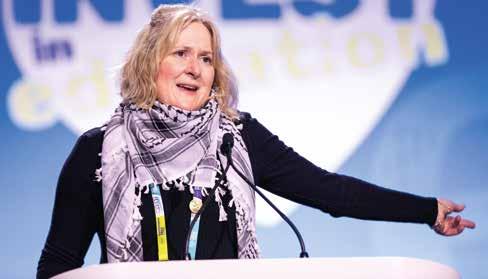
‘Champion
your excellent practice’
IN a rousing speech to conference, outgoing president Emma Rose told delegates: “I became a teacher because I wanted to change the world, and it’s through the union that we’ll be able to do that.”
She called for radical reform of the education system, describing the curriculum as “rigid, dull and uninspiring”, and urged members to resist the trend in England towards centralised control of pedagogy and prescribed schemes of learning, such as Oak Academy’s curriculum, brought in by a Government that “has facilitated a culture of low trust and respect for our expertise”.
“These damage schools’ capacity to relate to the experiences and needs of their communities, and undermine a student’s right to access a broad and balanced curriculum. We deserve better. We must continue to facilitate conversations in workplaces about what is taught, how it’s taught and how it’s assessed, and champion excellent practice that exists in our classrooms.”
Emma spoke of her pride at being part of a union “at the forefront of the debate on pay and workload”, before reeling off a list of wins by members, including those working at multi-academy trust United Learning (see page 8), who fought off attempts to leave the Teachers’ Pension Scheme, and members in Northern Ireland who won a three-year pay offer following 18 months of action.
Last year’s strike action showed our strength as a union, Emma said. “It led to us becoming more organised and galvanised than ever before.”





campaigns to keep BTEC provision; and support action in colleges where pay awards are not honoured.
Proposer Pippa Dowswell, from Islington, said the post-16 sector, like the rest of education, was “at breaking point”. She said many students were in mental health crisis, affected by issues including the pandemic, climate change concerns, and the pressure to succeed academically.
Post-16 teachers, too, were struggling, with many college managements putting in place pernicious accountability practices including inappropriate support plans, as well as judgemental observations and deep dives ahead of Ofsted inspections, added Pippa.
Members passed a motion for increased, ringfenced funding for special educational needs and disability (SEND), after hearing from Wiltshire deputy head Chris Dutton that the “system is broken”. Chris added: “Policy changes in the last ten years have led to an increasingly unmanageable financial situation, as well as decreased quality of SEND provision.”
Jade Watson, from Surrey, proposed a motion – passed by conference – calling for a national campaign to improve the pay and conditions of support staff employed at independent schools. “They are the backbone of our schools,” she said. An NEU independent sector survey showed 64 per cent were taking on additional paid work because they cannot survive on their salaries.
Chloe Rice, from Newham, moved a motion calling on the union to continue its fight to save early years provision, in decline due to the shortfall in Government funding. “Our maintained nursery schools – the jewels of the early years provision and practice – are being forced to close or merge as a response to cost-cutting plans. This is unacceptable.”
David McAllister, from Newcastle, decried the “devastation” caused by the dwindling provision and said: “If you do not care for the youngest and most vulnerable children in society, you do not care about children at all.”




educate Your magazine from the National Education Union (NEU) 18

‘An f-ing terrible job, Gillian’
“THIS Government has failed on curriculum, accountability, assessment, child poverty, school funding – and it has failed you.”
That was the stark message delivered by NEU general secretary Daniel Kebede when he addressed annual conference in Bournemouth. He reeled off a string of broken promises on smaller class sizes, 17,500 extra maths and physics teachers, protection of school funding and an enhanced status for the teaching profession.
“Gillian Keegan has said she is doing an ‘f-ing good job’, but Gillian, let me speak on behalf of the 500,000-plus NEU members: You. Are. Not,” said Daniel. “Indeed, you, and the nine other secretaries of state we have endured over the past 14 years, have done, to use your vernacular, an f-ing terrible job.”
He went on to say that Ofsted “seeps through the entire education system like poison”, damaging the quality of education – the very thing it is supposed to promote. In 30 years, it had failed to produce any evidence that it raises standards, he added. “Not a single piece of evidence.”
In a message to Ofsted’s new chief inspector Martyn Oliver, he said: “No amount of rebrand, no amount of reform can bring back the trust of the profession.”
Looking ahead to the General Election, Daniel said the union would campaign for all parties to invest in education and educators, and to end child poverty. “We will fight to make sure education is a priority issue that politicians cannot ignore,” he promised.
Racism vs inclusion
Jess Edwards, from the national executive, moved urgent motion 2: Impact of racist language on schools and communities. She condemned the comments of Conservative party donor Frank Hester, who reportedly said looking at Diane Abbott MP makes you “want to hate all Black women” and she “should be shot”. She condemned remarks by Lee Anderson MP that “Islamists” have “got control of London” and its mayor Sadiq Khan.
“Racism is a tool to divide us,” and this was the rhetoric of Germany in the 1930s, Jess said. Denise Henry, also from the executive, expressed her “solidarity with Diane Abbott”.
Sophie Toovey, from Torfaen, moved a motion criticising the lack of cultural diversity and inclusivity in the British curriculum. She said she was proud that Wales had mandated Black history lessons across the national curriculum, and it was time for others to follow.
“We’re a diverse education union, and need to be at the forefront of curriculum change and development. We need an inclusive curriculum, whether we’re in a diverse area or not,” Sophie said.



TLRs in primary schools
Loretta Campbell (see boxout, right), first-time delegate from Lambeth, told conference her branch advised members not to do extra work without extra pay. “Why should we?” Loretta asked. “When you learn how much you’re worth you’ll stop giving discounts.”
Conference also passed a motion calling on the union’s executive to organise a national bank of educator-led guidance and resources for disability equality to be taught across the curriculum at secondary schools. Kathryn Barton, from Birmingham, moved a motion on protecting trans and non-binary children.
Zareen Sajid, from Waltham Forest, moved a motion on climate change, which impressed the urgency of the issue. Zareen said: “Those who contribute the least to climate change are those bearing the brunt of its consequences.”
The motion called for the union to commit to a year of campaigning with other unions on tackling climate change by no later than 2026.




“Conference has given me a real insight into what actually happens, how the motions get passed. I would definitely encourage people to come.
“The things that you speak about in the classroom or the staff room get addressed. It means your voice, your opinions are being heard.”
Loretta Campbell, Lambeth first-time delegate
educate Your magazine from the National Education Union (NEU)


A Stiltz Homelift is an ideal and affordable alternative to a stairlift. You can now safely travel between the floors in your home while keeping your stairs the way they have always been.
Neat, discreet, affordable and elegant
A Stiltz Homelift can be installed into almost any room in your home.
A Stiltz is uniquely compact with the smallest model taking up just over half a square metre. At the touch of a button a Stiltz Homelift turns your now home into your forever home.
• Rapid service
• Cost-effective
• Freestanding designno wall needed
• Small footprint
• 3-floor travel available
Free, no obligation survey
A Stiltz Homelifts Consultant can visit your property to help you plan the best location for your homelift. They can also answer any questions you might have, as can any of the friendly, UK-based phone team.
For a FREE brochure or no obligation survey give Stiltz Homelifts a call today!
• Finance options available* The UK’s Number 1 Homelift
• Wheelchair model available
• Manufactured, installed and fully guaranteed by Stiltz
* ask an adviser for details
educate Your magazine from the National Education Union (NEU) 20
0808 149 7883 www.stiltz.co.uk
Rated ‘Excellent’
Why have a stairlift? When you could have a real lift!
Who needs the arts?
Words by Michael Rosen
Illustration by Dan Berry
Some people claiming to be educators, at their happiest when using calculators, reckon the way to develop this great nation is to squeeze the arts out of education.
Of course, they don’t say such things directly, they’re schooled in how to do it correctly. Did you notice how? Or perhaps you guessed: they pulled the levers in how schools are assessed.

At a stroke of the pen, they changed the priorities and, once it reached the ear of the authorities, student numbers doing arts courses dropped. As a result, arts courses get chopped.
Please help us out, as we’re simple fools: is arts education now just for private schools?

Michael Rosen educate Your magazine from the National Education Union (NEU) 21
Union people
Thank you for fighting for education
Blair Peach award
Roxanne Beckles, teacher, Vale of Glamorgan
Described as “a changemaker for Black members in Wales” by her division, Vale of Glamorgan, Roxanne’s commitment to antiracism education has benefitted educators and members across the country. In addition to her work as a supply teacher, Roxanne is an education officer with charity Show Racism the Red Card. She was also instrumental in organising the first Black educators’ conference in Wales, in January.

Nikki Simpson award
Pamela Cosgrove, teacher and NEU vice-president, Northern Ireland
Pamela said she was “delighted and humbled” to be recognised for the work she has done around training and development.
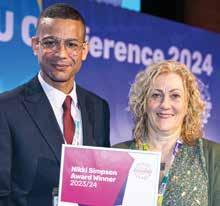
Roxanne said: “My parents were part of the Windrush generation, and as a Black British woman, I have lived experience of racism. Doing nothing is not an option for me. We have a duty to promote kindness and love. Collectively we can build on the achievement gained through the struggles of those who suffered before us.”
National officer of the year
Sarah Vaughan, district and branch secretary, Cheshire East

Sarah is “tireless in her pursuit of equality, justice and better conditions for staff”, says Rachel Sinden, one of the many people who nominated her. Sarah’s enthusiastic promotion of the union has seen Cheshire East’s membership increase to its highest level in over a decade.
She has done pioneering work raising awareness of the menopause at work, writing a school policy and training that fed into the union’s national policy, and has delivered training on SEND, mental health, rural isolation, domestic abuse and anti-racism. She has built relationships with local councillors and the community to ensure that education is a priority.
Sarah said: “Behind every district secretary, there’s a team of people. We’ve worked hard to make the district vibrant.”
She has promoted training opportunities, particularly those aimed at women members. She has introduced a mentoring scheme to support professional growth, organised media training for officers, and helped facilitate the Menopause in the Workplace course. She is working with reps to ensure every school has a menopause policy in place, which will be a focus next year, when Pamela becomes Northern Ireland NEU president.
An advocate for empowering girls, Pamela has shared training on period dignity across Northern Ireland, and facilitated schools working together to share resources.
Steve Sinnott award
Gavin Sharp, teacher and Pembrokeshire branch secretary
Gavin Sharp has worked tirelessly to grow the activist base across Wales since becoming an international solidarity officer. He is a strong advocate for Stand

Up to Racism, speaking at rallies and demonstrations, and has been a pro-Palestine campaigner for many years. Gavin has driven delegations from Wales to Calais to volunteer with Care4Calais, sharing his experiences to dispel misinformation about refugees. Criticising the lack of action, he said: “We know it’s possible to give people safe passage, so why doesn’t the Government act?”
Gavin said he was “honoured” to accept the award: “I am on a journey of discovery with lots more to do. We need to speak out for those who can’t.”
educate Your magazine from the National Education Union (NEU) 22
education
Every year at annual conference, the NEU presents awards to celebrate outstanding members, officers and other supporters for their commitment to education.
Annie Higdon award
Kathy Steelandt, teacher and assistant secretary in Denbighshire

Described as “an inspiration” by Elizabeth Mclean, who nominated her, Kathy has been an advocate for women for many years and recently became a member of the NEU’s women’s organising forum. She has challenged inequality in the workplace, ensured there are menopause policies in place and that pregnant women have appropriate risk assessments. She also organised International Women’s Day events across Wales. Kathy has led sessions on AGENDA, which empowers children to make positive relationships. Kathy said she was “honoured” to accept the award and urged educators to continue to speak out and challenge sexism. “The journey to challenge patriarchy and misogyny is not an easy one. So much has been achieved in our union and so much is still to be done, but I hold onto the belief that women can change the world to make it a better place.”
National rep of the year
Madeleine McClean, NEU rep, St Joseph’s Catholic Primary School, Luton
Madeleine became the rep at St Joseph’s Catholic Primary within weeks of joining the school. The NEU’s pay campaign had just begun and she successfully built a thriving and united union group, as well as garnering the support of parents and the local community.
“She reignited a passion among existing members,” said one of those who nominated Madeleine, while another commented that “she made striking purposeful, noisy and enjoyable on cold, early mornings”.
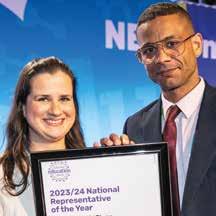
Madeleine said she was really honoured: “I am proud of how our NEU members have come together and supported each other and organised the most fantastic picket lines during the strike action. Without proper funding, our schools are suffering, and talented, experienced staff are leaving the profession. We have to fight for our children’s futures.”
Fred and Anne Jarvis award

Julia Waters
The award recognises Julia’s tireless campaigning for the radical reform of Ofsted, following the suicide of her sister Ruth Perry. Julia raised more than £50,000 through crowdfunding for Ruth’s inquest, after being denied legal aid. The coroner ruled that the Ofsted inspection had contributed to Ruth’s death. It led a pause in inspections, and updates to the handbook and training for inspectors around teacher wellbeing. A report, Prevention of Future Deaths, was issued to Ofsted by the coroner.
Speaking at annual conference, Julia said: “This award is not for me, it’s for Ruth.” (See page 14.)
Hilda Palmer, former teacher and NUT member
“Truly inspirational” Hilda was recognised for her lifelong commitment to workers’ health and safety and for highlighting the many issues that cause injury, ill health and death at work. In 2006, she set up Families Against Corporate Killing (FACK), which supports the families of people who died at work and helps them seek justice and answers. She recently supported the family of Ruth Perry and raised awareness of the dangers of Ofsted. She has worked alongside the NEU and other trade unions, delivering courses and presentations, and helping to challenge the Government and push for safer workplaces.

educate Your magazine from the National Education Union (NEU) 23

Benedict
Blythe’s sudden death at school is every parent and teacher’s worst nightmare. Emily Jenkins talks to his mother Helen about how best to support schools to cope with allergies.
BENEDICT Blythe was a five-year-old who loved going to school. He had suffered from multiple allergies from a young age that his parents were practised at managing.
On 1 December 2021, while at school, he ate a snack and went into anaphylaxis. Rushed to hospital, he died a few hours later.
Anaphylaxis is a life-threatening allergic reaction that can happen very quickly. Benedict had many allergies including milk, soy, sesame, eggs and nuts, which his family worked hard to manage.
“We had so many parents getting in contact with us after Benedict’s death, reporting that they felt fearful that their child would go to school and not come back,” says Benedict’s mother, Helen.
“Teachers were saying they were terrified about having a child with allergies in their class because they didn’t know how to keep them safe.”
More than two years on from that day, his family are still waiting for the result of the inquest, but Benedict’s death has become a driving force for his parents in raising allergy awareness. In December 2022 (the one-year anniversary of their son’s death), they established the Benedict Blythe Foundation (BBF).
Food-related anaphylaxis increasing in young people
Food-related anaphylaxis has increased considerably over the past 20 years. UK hospital admissions rose by an average 5.7 per cent each year between 1998 and 2018, with the largest increase among children younger than 15 years old. A total of 66 deaths were recorded in under-18s during that time.
There are around 680,000 pupils known to have allergies in English schools, with each average-sized class likely to have one or two students with an allergy. Allergies can also develop throughout a person’s life and data shows that 18 per cent of food allergy reactions and 25 per cent of first-time anaphylactic reactions occur at school –meaning teachers and parents might not even be aware that a child has an allergy until their first reaction.
continued on page 26

“Teachers say they are terrified as they don’t know how to keep a child with allergies safe.”
Helen Blythe (above)
Equipping educators as allergies on the rise
educate Your magazine from the National Education Union (NEU) 25
Portrait by Lucy Glen
continued from page 25
Despite these statistics, there’s currently relatively little that schools are expected to do in terms of putting safeguards in place, says Helen.
No allergy policy in third of schools
The REACT report, commissioned by the BBF this year, found that allergy management in schools varies widely. Analysing data from around 2,000 schools in England, it found that one in three schools do not have an allergy policy. Of the two thirds that do, there is huge variance in accessibility and content.
Statutory guidance on medical conditions does not explicitly mention allergies, despite it being both the most common chronic condition, and one with known school-setting fatalities. While there are measures available, including legislation, to allow for the purchase of medication, these are optional and not funded.
“There are a lot of teachers using their initiative and proactively working to make life better for children with allergies. They are doing amazing work, but we shouldn’t be putting them in a position where they have to go home at night, open their laptop and research what to do in a specific scenario and how to keep that child safe,” she says.
The report also showed that 70 to 80 per cent of the schools questioned did not provide staff with basic information on what food allergies are or their potential impact on pupils, while 55 to 60 per cent provide no training in managing allergic reactions if they arise in schools or on trips. A
quarter of schools provided no training on life-threatening anaphylaxis and what to do in an emergency.
EpiPens vs antihistamines
The treatment of anaphylaxis is to give adrenaline, by an injection into the outer muscle of the mid-thigh. Adrenaline treats both the symptoms of the reaction and can also stop it from becoming worse. Medicines such as antihistamines can help with mild allergy symptoms, but are not effective for anaphylaxis.
Adrenaline can be given by non-healthcare workers as an injection into the muscle using an adrenaline auto-injector (AAI), sometimes known by the product name EpiPen. Schools have been able to buy their own AAIs since 2017. However, almost half of schools included in the report did not hold any allergy medication or a life-saving AAI.
All schools must have a staff member on site who is trained in first aid, including administering an AAI and being able to identify signs of anaphylaxis. However, with the size of schools varying widely, Helen points out that by the time the first aider can be reached or has travelled across school, it might be too late.
“Teachers are being put in a really difficult situation,” she says. “They might not have the information about a child’s allergy. If they do have that information they might not have the training or the medication to be able to respond in an emergency.”
A set of AAIs only costs £90; however, with school funding already so
‘30 pupils with different needs is daunting’
In 2023, the BBF conducted a survey of 244 school teachers in England, to find out how they felt about managing allergies in schools. Respondents said:
n “It can be very daunting caring for 30 children with different needs, particularly during things such as class parties when children are invited to bring snacks in.”
n “It is a great responsibility. Sometimes I feel we should have extra staff for such situations.”
n “I find it very stressful and difficult.”
n “The only reason I feel confident in dealing with allergies is because my son has a nut allergy, not because of the school policy. Very few secondary teachers will be as aware as I am.”

26 educate Your magazine from the National Education Union (NEU) Feature


“Schools should be prepared and able to respond to an allergic reaction.”
tight it can be quite a significant sum for schools, which may feel they have to choose between buying AAIs or pens and paper, says Helen.
Call for Government funding
Reflecting on the BBF’s report, one of the country’s leading consultants in paediatric allergy, Professor Adam Fox, says it’s time for change: “Inquests into fatal anaphylaxis at school recurrently highlight the inadequacy of school policies. Food allergy is simply not understood, adrenaline pens are left to expire, and there is no clarity about how to respond to emergency situations. This is not acceptable. By educating the
Resources
n NEU guidance for educators neu.org.uk/HandSQuickGuide n Schools Allergy Code benedict blythe.com/schoolsallergycode n REACT report tinyurl. com/msrnty5d n Allergy UK allergyuk. org/resources/reducingallergic-reactions-to-food

whole school community about food allergy we can turn things around.”
The BBF has outlined recommendations for positive change. It is calling for policymakers and the Government to implement safeguards to protect pupils with allergies and is asking the Department for Education to provide £5 million of funding to support schools in implementing safety measures and organise checks to ensure statutory requirements are in place.
The BFF also wants schools, head teachers and governors to recognise any gaps in the way they manage allergies and take proactive steps to keep children with allergies safe.
Sarah Lyons, NEU lead officer for health, safety and environment, said: “The NEU is keen to work with the Benedict Blythe Foundation, and alongside other education unions, to do what we can to help improve understanding of food allergies and ensure that schools receive the support they need to create safe and inclusive learning environments for all children.”
Schools Allergy Code
To support educators, the BFF has put together a Schools Allergy Code, which outlines best practice and can help schools to keep pupils with allergies safe.
“Many schools may believe that if they don’t have a child at the moment with an allergy, there’s no need for them to have a policy in place,” says Helen. “But we know that 30 per cent of allergic reactions at school take place in children who have no known history of allergy. So all schools, whether they have a child with a known allergy or not, should be prepared and able to respond.”
educate Your magazine from the National Education Union (NEU) 27
































































educate Your magazine from the National Education Union (NEU) 28 Join our team: ocr.org.uk/assessor Examine with us
Build confidence supporting your students with assessment • Enhance subject knowledge
Great for professional development Mark A Levels Art & Design Geography Psychology • • • Law • Sociology • OCR HPH EduMJ24 indd 1 EduMJ24.indd 12/04/2024 09:57 InDependent DiabetesTrust P O Box 294, Northampton NN1 4XS www.iddt.org Charity Number: 1058284 Registered Number: 3148360 DOYOU HAVE A CHILD INYOUR CLASSWITH DIABETES? ASKFORYOUR FREECOPYTODAY A charity supporting and listening to people who live with diabetes www.iddtinternational.org enquiries@iddtinternational.org PASSPORT FOR SCHOOLS my child’s diabetes needs IT GIVES SCHOOL STAFF IMPORTANT INFORMATIO ABOUT MY CHILD AND SHOULD BE AVAILABLE TO EVERYONE RESPONSIBLE FOR THEIR CARE on ON INDEPENDENT DIABETESTRUST Type 2 Diabetes Management and Medication HELPLINE: 01604 622837 www.iddtinternational.org A charity supporting and listening to people who live with diabetes Diabetes What Schools NeedTo Know A charity and listening people who live with diabetes 01604 622837 www.iddtinternational.org TELEPHONE: 01604 622837 or EMAIL: enquiries@iddtinternational.org SCHOOLS NEEDTO KNOW
•
•
Better care after baby loss
Three quarters of NEU members are women, many of childbearing age, and figures show one in four pregnancies end in loss. Sally Gillen talks to Amy Kilpatrick about our new Maternity Matters resources.

AFTER Amy Kilpatrick had two miscarriages, her head teacher made her life hell for six years. Amy, then a primary school teacher, was demoted from the senior leadership team, called to meetings while still in surgical stockings and scrutinised in the classroom.
“I was desperately ill, and the head took that to mean I needed to be observed more,” recalls Amy. “She started to pick at what I did, to suggest I wasn’t capable of doing my job, but she could never get me on that because I’m a bloody good teacher. She moved me from my comfort zone of year 1 to year 5 and thought I would fail miserably. I didn’t.”
Amy’s son was attending the school nursery, but the head decided he wasn’t allowed on the premises outside of his time in class. While colleagues were allowed to bring their children in at, say, 8.15am, do a bit of work in their class and then drop their child off at the nursery, Amy wasn’t.
‘Ridiculous’ in hospital rather than work “She made my life extremely difficult,” says Amy. “I got a text message from the head, while in hospital, having almost bled to death, saying: ‘I don’t understand why you’re not at work today. It’s ridiculous.’
“Through my work with the union, I really felt strength, and it was the only thing that kept me in teaching.”
The last straw was when Amy asked what would happen if she had another miscarriage and was told by the head: “The governors will have to consider if they want to keep employing you.”
“She didn’t know it, but the head lit a fire in me that day,” says Amy. She was out of time to take the head to an employment tribunal, so Amy decided that she would take her horrible experience and use it to improve the workplace

“I was desperately ill… the head made my life extremely difficult.”
Amy Kilpatrick
experiences of other teachers who had gone through the frightening, distressing and lonely experience of pregnancy loss.
Policy on creating a caring environment
Amy became active in her local branch, Newcastle NEU, before becoming the Northern region member on the union’s national women’s organising forum. She wrote a model policy for her school (the head had left by then) on providing a supportive and caring environment. It was later adopted by other schools locally.
When, in 2022, the NEU questioned more than 7,000 members for our maternity survey, revealing what Amy calls an “avalanche of horror stories”, she was well placed to help the union develop a range of resources on pregnancy loss.
The policy she had created for her own school has fed into the union’s model policy, which covers issues including rights to time off, safe and fair working arrangements and compassionate return-to-work arrangements.
One of the things she hears time and again, says Amy, is that members just don’t know about their rights and how to protect themselves. This includes things like ensuring a risk assessment is carried out and regularly updated throughout the pregnancy, or knowing that antenatal appointments do not have to happen in your planning, preparation and assessment time.
She urges reps to make use of the resources: “The best thing a rep can do to support maternity rights in their workplace is to familiarise themselves with the support available on the NEU website and share the model policies with their employer. We’ve had great successes where large multi-academy trusts have adopted these policies, having a positive impact on members in multiple schools in one go.”
Know your maternity rights
The NEU website includes checklists, model policies and sample letters to help pregnant staff get the appropriate support.
“These materials inform and upskill people in asking for what they’re entitled to, being confident in their maternity rights and improving the experience of being pregnant in the workplace for all of our members,” says Amy. “Reps are a crucial part of sharing this good practice and will be at the forefront of ensuring the next time we survey our members we see a huge improvement in the experiences they have had.”
n Visit neu.org.uk/ maternity

educate Your magazine from the National Education Union (NEU) 29
Feature
Pregnancy loss For women and parents experiencing pregnancy loss including ectopic or molar pregnancy, miscarriage, termination/abortion, stillbirth or neonatal death, we call for: NEU3346/0224 Compassion understanding and reassurance if we experience a baby loss Dignity appropriate washing and toilet facilities at work Respect for our choices, our language to describe our experience Privacy protect our right to share or not to disclose our trauma Time support and time to grieve, to heal, to recover neu.org.uk/maternity Join us neu.org.uk/join-now

in January.
SET up by teacher and NEU equality officer Charlotte Carson, 21st Century Suffragettes is calling on all 16- to 18-year-olds to register to vote and become actively democratic citizens.
“Most young people don’t know that they can get on the electoral register at 16,” says Charlotte. “While they can’t vote until 18, research shows that if they vote in their first election, they’re much more likely to become lifelong voters.”
Less than 16 per cent of young people in NI registered to vote
The number of young people aged 16-24 who are registered to vote in Great Britain is falling, according to data from the Electoral Commission. It is lowest for 16- to 17-year-olds, where it has dropped from 45 per cent in 2015 to just 16 per cent in 2022. In Northern Ireland, the figure is even lower – which translates into a low voter turnout.
“Our futures rely on our votes. Without young people voting there are no new voices or ideas and no new approaches to our future. This prioritises older people and doesn’t consider young people’s needs.”
Poppy, Abbey Community College, County Antrim
In the 2019 UK General Election, only 44 per cent of people aged 18-24 voted, compared with 76 per cent of over-65s, data by Ipsos Mori shows. Young people care about their futures and their communities, Charlotte says, but many don’t recognise the value of voting, aren’t aware of the role they can play in shaping government policies, or feel reluctant to engage in a political system that they think doesn’t represent them.
‘Help them do the work, rather than do it for them’
A crucial part of the campaign is that it is being led by young people. The strategy is simple – one or two students are recruited to become 21st Century Suffragettes and deliver an assembly explaining the importance of registering to vote. This is followed up with a session, usually in tutor time or a citizenship lesson, where they guide their peers through the registration process. This is powerful, says Charlotte, because young people are much more likely to respond positively to their peers.
“The best way to empower young people is to help them do the work –rather than do it for them,” she says. “What the young people I’m working with are saying to their peers is, you might not be interested in politics, but politics is interested in you. If affects your life, whether you like it or not.
“It is vital that young people have a say in decisions that affect them. Issues including affording college or university, free public transport, climate change, mental health, improving the health service, and rights and equality are considered to be top priorities for young people, yet are rarely considered in politics due to the lack of youth representation. We hope to change this.”
Megan Smyth and Neha Anto, Our Lady St Patrick’s College, Knock
Sarah Thompson talks to the driving
Young people in Northern Ireland are on a mission to increase at Stormont
Interview Change the

educate Your magazine from the National Education Union (NEU) 30
Charlotte Carson (left) and Edel McInerney (right), NEU president in Northern Ireland, with fellow
Feature
political engagement among their peers, as part of a campaign launched force behind 21st Century Suffragettes, Charlotte Carson.
world
one vote at a time

“If you’re not in the electorate then you can be ignored, and there won’t be any policies that address your needs. If young people want political parties to make policies for them, they need to lobby for that. And you can’t lobby if you’re not even on the electoral register.”
Charlotte has put together a package of resources and advice for students, including sample assemblies, training in public speaking and the opportunity to connect with other activists through the 21st Century Suffragettes network. “We really want to support students to work collaboratively, sharing resources and information,” she says.
“I felt I was not educated enough on the subject of politics to vote and my issues as a young person were not represented. However, through many conversations with my parents, I came to the realisation that we must take time to think about our choices, hold politicians accountable to their promises and take action for future good. We may not feel like we are seen by the government, but this will never change if we do not vote.”
Ellen McComb, Abbey Community College, County Antrim
Campaign launch at Stormont
The campaign launched at Stormont in March and was attended by representatives of the Social Democratic and Labour Party (SDLP), Democratic Unionist Party (DUP), Sinn Fein, the Education and Training Inspectorate and the Education Authority. Students called on the Northern Ireland Assembly to include voter registration on the sixth form curriculum. Charlotte hopes the launch will translate into education policy. “This is about our democratic health, and schools can play a vital part in that. It seems like such an easy win. All the Government needs to do is include registering to vote on the sixth form curriculum.”
While registering to vote can be done in five minutes, Charlotte says it provides the perfect opportunity to do a little more work about democracy, discuss what issues matter to students and how to debate and campaign on these.
“Because what’s the point in voting if you’ve no idea what kind of world you want to live in?” she says. “What are you going to vote for?”
Trade unionism’s role in growing democracy
More than 50 young people in schools across Northern Ireland have now signed up to the campaign, but Charlotte would like to see a 21st Century Suffragette in every school across Northern Ireland and the rest of the UK and is urging NEU members to help grow the campaign.
“It’s really important for us as a union to show that we’re committed to democracy. Being a trade unionist is a vital ingredient to a functioning democracy and, as union members, we’re playing our part in that by getting young people to vote.
“Hopefully, they will feel that things are possible and that you can get stuff done when you get together. This is a gateway into democratic activism for young people. It starts with an assembly and hopefully they’ll end up changing the world.”
n To join the campaign, email feminismschools@gmail.com
n Join the Facebook group at 21stCenturySuffragettes
n Visit democracyclassroom.com
n Visit electoralcommission.org.uk/ resources/welcome-your-vote
educate Your magazine from the National Education Union (NEU) 31
Feature
21st
Century Suffragettes campaigning at Stormont, the seat of the Northern Ireland Assembly
Find out more
Give
them confidence,
and life skills resilience

Award-winning outdoor adventure residentials for all ages
36% increase in resilience
Impact Analysis 2023






Read our latest research in The Journal of Adventure Education & and Outdoor Learning, an o icial, peerreviewed publication of the Institute for Outdoor Learning.
‘Building resilience and wellbeing for post-covid adolescents through outdoor adventure’
By Dr John Allan, Head of Impact and Learning at Inspiring Learning
by Tim Sanders

Scrape the shiny surface to reveal grim reality

Warwick Mansell is a freelance education journalist and founder/writer of educationuncovered.
STAFF “at breaking point”. Teachers slogging through 12-hour days plus weekends, and then being signed off sick through overwork. Budgets being so stretched that pastoral support for pupils is suffering.
This is how NEU reps describe the conditions at a school, which by the Government’s measures of success – Ofsted and exam results – is one of the most successful in England. But is the reality for those working within it sustainable?
This question came to mind when I met a group of reps outside the south London headquarters of the Harris Federation, England’s second-largest academy trust. They were gathered to present a letter signed by more than 1,000 NEU members at Harris,
seeking improvements to working conditions in its secondary schools and sixth forms.
The union is calling on Harris to increase and protect teachers’ planning, preparation and assessment (PPA) time; guarantee that they do not work beyond their annual 1,265 hours of directed time; ensure pay progression for teachers; and pay all support and teaching staff a salary at least in line with the innerLondon living wage of £23,300.
I was concerned to hear from reps that Harris teachers often lose their PPA time through, for example, having to cover for absent colleagues; and that pay progression is linked to pupil results, with Harris said to be making this conditional on pupil progress being “at least in line with national standards”.
Harris expects a lot of its staff, on behalf of the often disadvantaged pupils they teach. But long hours were impacting members’ health, one rep told the gathering, adding: “Many are at breaking point and feel they are giving 100 per cent but it’s never enough.”
Two other reps told me that support for pupils was suffering, from a combination of tight resources and staff recruitment and
retention difficulties. One said: “Students need lots of pastoral care, but there’s not the funding for it… we need better outreach, but there’s no support for that.”
People might not be surprised, given the state of funding for education more generally. However, this is a trust which finds £560,000 a year for its chief executive in pay and pensions, and had six people on packages worth at least £240,000 a year each in 202223. It also had accumulated revenue reserves of £33 million as of last year.
Harris’s annual accounts paint a glowing picture of its work, as do the Ofsted reports on its schools, which rarely seem to stray below Outstanding these days, and where only one academy in Harris’ history has ever scored worse than Good.
But the reality, as indicated by these tales from the chalkface, seems to show up the superficiality both of Ofsted reporting and what exam data and financial declarations alone can reveal. Schools in England are seeing their staffing and education provision under huge pressure. And this large academy trust is no exception.
educate Your magazine from the National Education Union (NEU) 33
Opinion
Cartoon
Ask the union
Demanding parents
I’VE started teaching in an independent school and am struggling with the unrealistic demands of parents. I am expected to be always available to talk about students’ progress, and one parent even demanded their child be put in the top set of maths. Can I do anything?
Teachers’ workloads are already unmanageable without the added pressure of being expected to respond to parents during evenings and weekends. Schools need to ensure that policies and procedures are in place to help staff deal with work outside of core school hours. If requests for support from management are not upheld, speak to your colleagues to deal with this issue collectively with the help of a workplace rep.
Regarding the parent demanding their child be placed in the top set, speak to your line manager or head teacher for advice in dealing with this parent as their request is inappropriate. If they do not support you, speak to your school rep or regional office immediately.
Change to working days
I TEACH two days a week in a primary school. I’ve been told that next term my days of work will change, so that I can attend the all-staff meeting. It’s a day I have caring responsibilities. Can they do this?
Check your contract of employment to see whether it sets out specifically what days you work and whether your employer has any contractual right to change your working days. If you have specified working days,

particularly if you have always worked those days, and the contract does not say anything about ‘varying’ your working days, then your employer cannot expect you to change without consultation/agreement. If your contract does allow for changes, but that has never been invoked, you may still be able to argue that they cannot simply change your days as proposed without consulting and seeking to agree the changes.
Regardless of your contractual position, if you would not be able to change your caring arrangements within the timescales proposed (or at all) you should make this clear to your employer. It may be that you can come to a mutually agreeable solution to delay the
change to the following school year, or to receive minutes of the all-staff meeting, or for the meeting to take place on alternate days each week so you can attend every other one. Speak to your workplace rep for further advice.
n If your question is urgent, please call the AdviceLine on 0345
Free CPD webinars for all NEU members
NEU members have exclusive access to our continuing professional development (CPD) webinars. Here are some of the courses coming up.
Leaders Building a culture of inclusion, effective deployment of support staff
The National Association for Special Educational Needs discusses wholeschool approaches to SEND, how to create an ethos of acceptance and celebrate difference.
15 May 3.45-5pm
Primary Targeted and specialist support for children with speech and
language challenges in a mainstream classroom
Ways to adapt teaching, differentiate learning and use targeted strategies.
16 May 3.45-5pm
Effective support for selective mutism Providing strategies to equip staff with the tools they need to support pupils of all ages who have selective mutism.
20 May 3.45-5pm
Overcoming the barriers of poverty: enrichment and extra-curricular for all Child Poverty Action Group explores what schools can do to increase
participation and inclusion for children from lower income households in extracurricular and enrichment opportunities.
12 June 4-4.45pm
School librarians building networks and teamworking: who are your friends?
How to maximise communication skills, team dynamics and collaboration in the provision of the library service across the school community.
3 July 3.45-5pm
n Webinars are available for 14 days.
n Visit neu.org.uk/national-cpd
34 educate Your magazine from the National Education Union (NEU)
n Please email your questions to educate@neu.org.uk
811 811 Contact us…
A class act
Wowing pupils with tales of the unexpected
Emily Jenkins discovers what makes supply teacher and author Emma Rosen (pictured) a class act.
WHEN Emma Rosen’s father took her scuba diving aged 13, little did she know the experience would dramatically shift the direction of her life.
“We were in the Red Sea and went to a reef that had been bulldozed for redevelopment. I thought: I want to learn more about this and make a difference. It was a moment that really affected my life.”
Formerly more interested in “arty and creative” subjects, her underwater dive sparked a lifelong passion for marine biology. She says that, thanks to some amazing school science teachers, she studied marine biology at university before becoming a teacher herself, so that she could share her love of the subject.
“I’m one of those people who naturally ends up teaching people, because I want to share the things I’m excited about,” she says.
As a secondary school science teacher, who lives on the coast in south east Kent, Emma tries as much as possible to introduce marine concepts and habitats into the curriculum alongside the terrestrial ones that students are usually more familiar with.
“If we’re studying a food chain, I’m going to get a marine food chain in there. If we are studying a species, I’ll try to include a marine species,” she says.
Teaching and storytelling
In recent years, Emma has also started to explore her arty and creative side. Having worked as a permanent science teacher for over ten years, she took a career break in 2018 when her third child was born and began writing and self-publishing.
Her most recent endeavour is a series of children’s books which brings together her love of marine biology, teaching and storytelling. Sponsored by Natural England, the Government’s adviser for the natural environment, she has so far published two books as part of a series called Discovering Marine and Coastal Habitats.
Secret Seagrass Meadows and Captivating Kelp Forests, both illustrated

“Children are definitely more climate conscious, and from an early age.”
by Rhiannon Thomas, aim to help four- toseven-year-olds understand important local habitats under the water. Captivating Kelp Forests was published in February this year, with 200 copies given away to local schools. Emma, who now works as a secondary science supply teacher, has also begun travelling across the UK to share her love of marine life with primary children. She
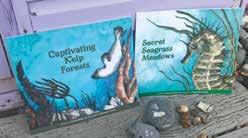
says that, initially, it was a bit of a shift moving from only teaching secondary school students to reading and discussing her books with groups of primary school children but, fortunately, she had support from primary colleagues when planning her classes.
Enthusing pupils with local stories
Wherever she teaches, Emma says she likes to focus on marine habitats that are local to her students: “Habitats under the sea are sort of invisible. But, for example, in Hampshire, you have these huge kelp forests. I want to show that to children to help them understand these stories are not about some far-off land. They’re under the water right here. And it’s amazing to engage them in that.”
In almost 20 years as a teacher, Emma has noticed a change in young people’s understanding of the environment. “They’re definitely more climate conscious, and from an earlier age,” she says. What drives her is helping children and young people to grow up understanding why it’s important to protect these habitats.
Ultimately, whatever Emma does, she says it is driven by her love of teaching. “I love making difficult concepts understandable. When you break something down and suddenly there’s that click and they say, ‘oh I get it’. That feeling is really amazing.”
by
educate Your magazine from the National Education Union (NEU) 35
you know
class act? Email educate@ neu.org.uk n Emma’s books are available at emmarosenbooks.co.uk
Do
a
PHOTO
Elaine Kingston




PW PRODUCTIONS PRESENTS ADAPTED BY STEPHEN MALLATRATT SUSAN HILL’S FINAL TOUR DATES REMAINING BOOK NOW AT THEWOMANINBLACK.COM AN INSPECTOR CALLS DIRECTED BY STEPHEN DALDRY J B PRIESTLEY’S CLASSIC THRILLER The National Theatre’s Landmark Production UK TOUR NOW ON SALE LAUNCHES AUG 2024 BOOK NOW AT ANINSPECTORCALLS.COM WRITTEN BY ROSS WILLIS DIRECTED BY SALLY COOKSON HHHHH “A GIDDILY ENJOYABLE NEW PLAY THAT DESERVES TO BE PACKED TO THE RAFTERS” THE GUARDIAN UK TOUR NOW ON SALE LAUNCHES SEP 2024 BOOK NOW AT WONDERBOYPLAY.COM

Remembering how fragile peace can be

Neil Sledge is the international solidarity officer for Wirral NEU and is co-chair of the North West board for UK charity Remembering Srebrenica.
ON 11 July 1995, Bosnian Serb forces massacred at least 8,372 Bosniak Muslim men and boys. It was the greatest atrocity on European soil since World War II.
These individuals are more than a number; they were the loved ones – the fathers, husbands and sons – of those who were left behind. Many women lost all the male members of their extended families.
The International Court of Justice (ICJ) and the International Criminal Tribunal for the Former Yugoslavia (ICTY) have both ruled that the mass execution constituted genocide. In 2009, the European Parliament declared 11 July the official day of remembrance for the victims of the Srebrenica genocide across the EU.
Tackling intolerance in the UK
Charity Remembering Srebrenica recognises that we are building a cohesive society here in the UK, but discrimination, promotion of hatred, fear and division, extremism and exclusion persist. We, as individuals and as communities, must play our part to create a better and safer society for all.
Our theme for 2024 is ‘I am because you are’: we cannot be fully human without others to be human with. We know how fragile we are and how quickly relationships fracture.
We are committed to using the lessons of Srebrenica to tackle hatred and intolerance to build a better, safer, more cohesive society by: n organising commemoration events and bringing communities together to remember the victims of Srebrenica n helping people to learn the lessons from the genocide in Srebrenica and setting up projects to build safer, more cohesive communities n creating champions who stand up against hatred and intolerance in their communities, and taking impactful social action in the UK to improve and consolidate community cohesion.
Dignified resilience of survivors
In 2017 I joined a group of other NUT members on a delegation to Bosnia through Remembering Srebrenica. We met a survivor from the siege of Sarajevo, another from the death march (when upwards of 10,000 Bosnians fled Srebrenica following a Serbian invasion –just 3,000 survived), and another who survived a mass execution. We visited the memorial centre and mass cemetery at Srebrenica.
We met members of the Mothers of Srebrenica activist and lobbying group, some of whom are still searching for the remains of loved ones, and who continue to commemorate and campaign for justice. Burials still take place annually on 11 July as further remains are located and identified.
These witnesses were keen to impress on us the importance of remembering, educating and taking action to help prevent such escalation of hate happening here, or anywhere. Their dignified resilience is as powerful as their stories.
Promoting peace and respect
Since our return, many of those delegates have become active international solidarity officers, community champions or union officers. As a community champion in Merseyside I have organised – with NEU, Remembering Srebrenica and local authority support – fringe events with survivors and Bosnian refugees at annual conferences, peace walks, exhibitions and more.
The messages from survivors have never been as important as now: we must all, in our workplaces, classrooms, homes and daily lives, strive to challenge prejudice and promote unity, diversity, peace and respect.
Classroom resources
n Remembering Srebrenica NW and NEU International have published a new anthology of children and young people’s poetry, curated by award-winning author, poet and screenwriter Nik Perring. Visit tinyurl.com/p534mutb
n A video lesson by Nik and teaching resources around the themes of diversity, respect and equality can be found at srebrenica.org.uk/learn
International
educate Your magazine from the National Education Union (NEU) 37
In 2017 Neil (far right) joined a group of other National Union of Teachers members on a delegation to Bosnia through Remembering Srebrenica UK
Reviews
Books as both mirrors and windows
Jon Biddle, English lead and NEU rep at Moorlands Primary in Norfolk, is passionate about fostering a love of reading for pleasure. Here he shares ideas and tips for schools to try.
I TEND to spend most lunchtimes in my classroom. I’ll occasionally venture into the staff room if I know there’s cake around, but I generally use the time to prepare for the afternoon session.
Because they know I’ll be there, there’s often a few children who wander in to read or do some drawing.
Last week, two sisters who’d recently joined the school from Nigeria came in and headed towards the picturebook box. At the front was a copy of Sulwe by Lupita Nyong’o and Vashti Harrison, a beautifully heartwarming book that addresses the issue of colourism. They immediately started talking excitedly about the illustration on the cover. Grabbing a couple of beanbags, they sat down and spent the rest of lunchtime reading it to each other, returning the following day to enjoy it again. It’s only a single example but it helps illustrate how essential genuine representation is in the books that are available to our pupils and school community.
Rudine Sims Bishop, professor emerita at Ohio State University and often referred to as ‘the mother of multicultural children’s literature’ in America, wrote in 1990: “Books are sometimes windows, offering views of worlds that may be real or imagined, familiar or strange. These windows are also sliding glass doors, and readers have only to walk through in imagination to become part of whatever world has been created by the author.
“When lighting conditions are just right, however, a window can also be a mirror. Literature transforms human experience and reflects it back to us, and in that reflection we can see our own lives and experiences. Reading, then, becomes a means of self-affirmation, and readers often seek their mirrors in books.”
Each year, the Centre for Literacy in Primary Education releases its Reflecting realities report, which looks at ethnic representation in children’s literature in the UK. On the whole, the figures are encouraging.


The percentage of children’s books featuring racially minoritised characters increased from four per cent in 2017 to 30 per cent in 2022, and books with racially minoritised main characters increased from one per cent to 14 per cent during the same time.
However, the challenge schools face is getting these vital books into classrooms and libraries, as well as improving pupil and staff awareness of them. Budgets are tighter than ever, but all our children, without exception, deserve to see themselves represented in books.
Diverse wishlist at a local bookshop
My school is fortunate to have a supportive parent-teacher association (PTA), which has helped us purchase diverse books over the past few years. If you have a PTA, talk to them about the importance of having representative literature in the school; even better, get the children to talk to them about it.
We also created a wishlist with a local bookshop that parents and carers can purchase from at Christmas or the end of the school year. There are recommendations in our school newsletter and on our Facebook page, as well
as being a regular feature – led by our Reading Champions – in our weekly celebration assembly.
It’s essential that diverse and inclusive books in schools are authentic, not tokenistic, and are created by writers and illustrators with a range of backgrounds who can paint characters and worlds with integrity.
Darren Chetty and Karen Sands O’Connor write a regular column called Beyond the secret garden, in Books for Keeps magazine (booksforkeeps.co.uk), which will help guide teachers and librarians in the right direction.
Children’s books can do so much, but of course they have their limits. They won’t stop hate, racism, Islamophobia, antisemitism, sexism or homophobia. However, they can help change our attitudes towards difference.
As Rudine Sims Bishop says: “When there are enough books available that can act as both mirrors and windows for all our children, they will see that we can celebrate both our differences and our similarities, because together they are what make us all human.” @jonnybid
Lupita Nyong’o’s ‘beautifully heartwarming’ Sulwe
educate Your magazine from the National Education Union (NEU) 38
Read more ideas from Jon next issue
Professor Rudine Sims Bishop
PHOTO by Ohio State University
Read a book that other educators might find useful? Send us your 100-word review to educate@neu.org.uk including a link to the book, plus your membership number, and your review could be published.
Changing Perceptions

WHY do some pupils display challenging behaviour? Graham Chatterley, education consultant and experienced teacher, explores the reasons in this fascinating book.
Looking at the science of behaviour, he delves into why pupils react in a particular way to situations and how to provide a secure, safe space for them. There are suggestions on avoiding escalation and conflict, and case studies are included alongside examples of the author’s own experiences.
The aim is for educators to change their perceptions and provide an empathetic approach in the classroom. An essential resource for anyone working in education.
Cindy Shanks
Changing Perceptions: Deciphering the language of behaviour, by Graham Chatterley. Crown House Publishing. £17.99.
Campaigning for socialism
MAX Morris, who was president of the National Union of Teachers in the 1960s, and his wife Margaret Morris, spent their lives campaigning for social and educational change. These memoirs chronicle their fight for a truly comprehensive educational system from the 1950s to Max’s death in 2008. Margaret and Max’s individual memoirs provide dual perspectives alongside intelligent analysis and insight into the political and trade union movements through the second half of the 20th century. Margaret’s personal experiences of evacuation as a child and political activism through the Cold War will be of interest to many union members. Seeds of educational privatisation and centralised control were sown decades ago and are recounted in the book. Max’s experience as a head teacher “who never received a day of instruction during his whole career” are unimaginable today.
Jo Allen

Campaigning for socialism: Memoirs of Max and Margaret Morris, by Margaret Morris. Austin Macauley Publishers. £12.50.

The working classroom
THIS book is a manifesto for equity in education, backed up with suggestions for achieving it in every school. It provides practical tools and strategies to help schools address the needs of working-class students. Although the authors have a background in English and drama, the strategies – like adaptive teaching – can be applied across the curriculum.
Underpinned with academic scholarship, the engaging style of the authors more than sugars the pill and includes anecdotes by the likes of comedian Frankie Boyle.
Mike Follows
The working classroom: How to make school work for working-class students, by Matt Bromley and Andy Griffith. Crown House Publishing. £18.99.
Gardening with Emma
THIS book is jam-packed with advice, information and activities to get children excited about and involved in gardening. And the best thing of all is it is written by a child.

Over the course of the book many areas are covered such as plants we can eat, wildlife found in a garden and of course what to grow and how.
Colourful images and a clear layout make this user friendly, adding to its potential to inspire a future generation of gardeners. Adults are sure to find lots of new ideas and inspiration too.
Sian Sparrow
Gardening with Emma: Grow and have fun – A kid-to-kid guide, by Emma Biggs. Storey Publishing. £8.99.
Self-worth in children and young people

AUTHOR Rachel Burr examines approaches to improving children and young people’s self-worth. Useful, practical suggestions are provided to help young people develop strength and resilience. Rather than adults making quick-fix suggestions, the author is passionate about children’s views being heard in student-centred groups. She believes in allowing students time to discuss their problems, contemplating the whole picture. Ideas include group sessions outdoors, and meditation techniques to discover a deeper meaning to life to give children coping mechanisms for dealing with personal challenges. An excellent resource.
Cindy Shanks
Self-worth in children and young people, by Rachel Burr. Critical Publishing. £19.99.
educate Your magazine from the National Education Union (NEU) 39
Visits and resources about water safety
I READ with interest the article about water safety education (Educate, January/February, page 9). I wish to make members aware of the teaching resources
and outreach work undertaken by the Explorers volunteers at the Canal and River Trust.
As a semi-retired teacher, I volunteer at the Pontcysyllte Aqueduct at the Trevor Basin in Chirk, near Wrexham. We run

Teacher’s pet Terry
Terry is the beloved turtle of Kassia Rodgers, a French teacher in Ealing.
workshops and guided tours, and visit schools to deliver assemblies about water safety. We can adapt the workshops and tours to a specific topic (such as local history or science, technology, engineering and mathematics activities). We have worked with all ages, from nursery to secondary pupils.
Every area in the UK has its own group of volunteers,
CHRIS Cornwell took the photo (left) of British trade unionists picketing South Africa House in London in our feature about the London Recruits (Educate, March/April, page 20).
He says: “I was a volunteer at the Anti-Apartheid Movement’s main office in London in the early 1970s. I did everything from mailing out Anti-Apartheid News magazine, making coffee, running off minutes, making posters and taking photos.
“I was working in magazine production and printing at the time, but became a teacher at 40, after I completed a five-year, part-time degree course.
“It was great seeing this photograph again.”
Kassia says: “Terry features in all my lessons, simply by being my computer background. Students always ask after her and want me to bring her into school. “Their faces are a picture when they learn that Terry is 14 years old. I love being able to talk about her every day.
“She also has an Instagram account: @the_turtle_terry.”
If you have a treasured pet you’d like to show off, email a high-resolution photo with 50 words about what makes them so special to educate@neu.org.uk
usually based at a museum or place of interest. There are plenty of excellent, free materials online for teachers to access, including games and activities to promote class discussion. They can be used independently or with a visit, workshop or assembly we have delivered.
n Visit canalrivertrust.org.uk/
explorers
Geraldine Hughes, Flintshire
Raising money for stem cell charity
AT the beginning of December, our dear friend and colleague Shivani was diagnosed with acute myeloid leukaemia. She has started chemotherapy and must have a bone marrow transplant. We want to show Shivani our support, so are combining two of her passions, football and fitness, to raise money for a cause close to her heart – the Anthony Nolan charity. On 11 May, three of her colleagues will attempt to run 100km between all Premier League and Championship football stadiums within the M25. n Visit justgiving.com/page/ shift4shivani
Charlie Blair, Battersea

educate Your magazine from the National Education Union (NEU)
40
Letters
Please write The editor welcomes your letters but reserves the right to edit them. Write to Letters, Educate, NEU, Hamilton House, Mabledon Place, London WC1H 9BD or email educate@neu.org.uk
Please note we cannot print letters sent in without a name and postal address (or NEU membership number), although we can withhold details from publication if you wish.
Fear of Ofsted a part of the welcome pack
SHOULD we be worried that a poem written by the legendary Michael Rosen, poking fun at the state of Ofsted, could not be more accurate (Educate, March/ April, page 19)?
Memories of my first teaching post over a decade ago include a fear of Ofsted being instilled right from the word go – it was almost as though it was part of the welcome pack. It saddens me to say, over the years it seems very little has changed.
I became a teacher to instil a love of learning in pupils and take pride in watching them thrive in their journeys. Did any part of my desire to teach include a longing to please Ofsted? Absolutely not. There seems to be an undeniable culture in schools of asking: What would Ofsted want to see? What would Ofsted be looking for in a learning environment? What evidence would Ofsted need? Soon, through a process of osmosis, this is entrenched in teachers and becomes a mindset difficult to change.
Teachers fear Ofsted because middle leaders fear Ofsted. Middle leaders fear Ofsted because senior leaders fear Ofsted. Senior leaders fear Ofsted because head teachers fear Ofsted.
Whether your school is awarded Inadequate or Outstanding still holds so much significance. This being based on a two-day visit every four years is ludicrous.
But imagine if we acknowledged that the system is not working and changed it? Imagine if whole-school development was a supportive process? Imagine if teachers attended staff meetings entitled: What are our children looking for?
Can you imagine asking teachers, who work with our children five days a week, their opinion? What might Michael Rosen’s poem read then?
Rebecca Todd, Tonbridge

Star letter Women in Revolt! at Tate Britain
I WAS privileged to travel with 12 NEU women reps (pictured above) from across the South West to visit Tate Britain for its latest exhibition, entitled Women in Revolt! For over three hours we were immersed in more than 100 pieces of women’s art from across 30 years of our social history.
The political and social activism of diverse groups such as the women of Greenham Common, the Hackney Flashers and the Organisation of Women of African and Asian Descent (OWAAD) highlighted that women have been persisting in the fight for equality for too long. I was blown away by the variety of mediums used by these talented women to highlight social injustice.
We came away with mixed emotions, but were thankful for the legacy of women and union members that paved the way for legislation changes such as equal pay and maternity rights. It made our group more determined to ensure we keep persisting and insisting that more is done to support women in the workplace.
Some of the most reflective works showed the cognitive and emotional load of women as workers, parents and home-makers. As a group, we had the opportunity to talk to each other about our own personal
CLASSROOM confidential
In my year 3 class, we were talking about volcanoes, making the distinction between active, dormant and extinct ones.
Upon hearing the definition of extinct, one little girl piped up:
“My grandma’s extinct!”
It was an amusing yet sad comment. I love the way her mind worked to make that connection.
WIN!
Send us your funny stories to win a £30 gift voucher
stories of our roles as teachers, leaders and carers. It appeared that many of the issues faced by women artists of the 1970s are still resonating with us 50 years on. It was liberating to be able to converse, offload, laugh and discuss art and politics with each other.
A huge thanks to Elly, Charlotte and Meryl, our NEU SW women’s reps, for suggesting the trip. It was a great day for all of us to celebrate being women educators.
Nicky Butterworth, NEU rep, Wiltshire
educate Your magazine from the National Education Union (NEU)
41
A father’s devotion leads to incredible patented pillow –one day all pillows will be made this way
EXTRA COMFORT AND SUPPORT
from a lifethreatening accident, her father Alexander looked everywhere for a pillow that would keep her comfortable throughout the night.
A er purchasing dozens of di erent types and nding none that worked, Alex, a renowned furniture and domestic product designer, decided to engineer his own.
UNIQUE BREAKTHROUGH
He made a breakthrough when he realised that all pillows spread out and atten down as the weight of the head rests on them. is attening progresses through the night, leaving the head and neck poorly supported – and sleep interrupted. is is why many people nd themselves half awake and ‘pillow-punching’ in the middle of the night, desperately trying to get comfortable.
e innovative model that Alex designed has internal ties that hold the lling in place, and pull the pillow in and up to cradle the head and neck. is provides extra comfort and support that lasts through the night and ensures that you get the most bene t from an undisturbed sleep.

I can honestly say that your pillow has made the world of difference… and fully endorse your pillow as being quite unique in its ability to maintain support throughout the night.
Dr Deane
Halfpenny
Harley Street Consultant and Spinal Pain Specialist
MADE IN THE UK



Made in the UK, the Gx Pillow comes in a choice of two levels of support: Medium-so , which most people seem to prefer, or Medium- rm for those who like a little more resistance. Alex’s desperate desire to help his daughter Georgia has led to a pillow that has also transformed the lives of thousands of people. So if you have spent a lifetime looking for the perfect pillow, your search may well be over! INFORMATION: gxpillows/0800 316 2689

































































































cannot believe that after 40 years I





ADVERTISEMENT
Alexander Miles, inventor of the Gx Pillow pictured with his invention
“ “ A Poor sleep? Aches and pains? Here’s the solution...
have finally found the best pillow ever!!!! It simply stays put and so comfy, fabulous, must buy more for hubby and a spare. Izzy, Yorkshire “ “ The amazing helps thousands sleep better PillowTM Unique internal tie technology maintains shape throughout the night Provides comfort and support Integral air vent keeps you cool Luxurious 100% cotton shell Hypoallergenic Polycoz lling Designed, patented and made in the UK Choose from Medium-soft or Medium- rm P P P P P P P SINGLE PILLOW £29.99 £39.99 TWIN PACK £44.99 £59.99 25%off wit h code EDU2 forEducate Readers *Terms and conditions apply - please see website for details. 2 PILLOWS FOR £59.99 £44.99! Enjoy a great night’s sleep AND 25% OFF! THAT’S... 25% off for Educate readers with code EDU2 Or buy 1 Gx PILLOW for £39.99 £29.99 ChoosefromMedium-soft,Medium-firmoroneofeach! 0800 316 2689 gxpillows.co.uk LinesopenMon-Fri9am-5pm. QuoteEDU2for25%off ORDER NOW! FREEPHONE: OR GO ONLINE: EnterEDU2indiscountboxfor25%off SCAN HERE and code will automatically be applied £15 SAVING! £10 SAVING! OUR PROMISE TO YOU! Sleep on the Gx Pillow for 30 nights and if you are not completely satis ed, we’ll give you your money back* NEAR tragedy has led to an amazing new development in sleep technology. When Georgia Miles was recovering
I
BIGGEST EVER DISCOUNT for Educate Readers – 25% off! £4.95 Post to: FREEPOST BEAUTIFUL SLEEP No other details or stamp required Description Tick your preferred pillow(s) Price Qty Subtotal Postage & Packing ORDER TOTAL I enclose a cheque payable to Beautiful Sleep for £________ Or charge my credit/debit card: Card No. Expiry CVC Name Address Postcode Tel no Signature / £15 o ! Gx Pillows Twin pack 2 x Medium-soft (was £59.99) £44.99 2 x Medium- rm (was £59.99) £44.99 1 x Med-soft + 1 x Med- rm (was £59.99) £44.99 £10 o ! Single pillow 1 x Medium-soft (was £39.99) £29.99 1 x Medium- rm (was £39.99) £29.99 EDU2 Email
Bring the drama

THE National Theatre has launched new educational resources to enable students to explore the work of leading contemporary artists, including directors and playwrights.
The pilot series, Practitioners in Practice, has been developed by theatre director Katie Mitchell and is aimed at secondary school students, particularly those studying A-level drama. The first resource in the series explores Katie’s own work and the key features of her style. It includes a film for students and an education pack for teachers.
n Visit tinyurl.com/ydj4cjk2
Inspiring the scientists of tomorrow

THE Royal Society has teamed up with Professor Brian Cox to launch a new series of classroom experiment videos aimed at students aged 11 to 14 years old.
The series is designed to support educators, including non-specialist science, technology, engineering and mathematics (STEM) teachers, to bring practical learning into the curriculum. The free videos and resources look
at some of today’s most pressing scientific issues, including ocean acidification, genome editing for sustainable crop production, machine learning and its use in cybersecurity, and carbon capture and the loss of biodiversity. Each topic includes ideas for simple experiments, further exploration of how the science is developing, and interviews with scientists who are doing cutting-edge work in their field.
n Visit tinyurl.com/mj7pnrcv
Hitting the high notes

FRIDAY Afternoons, led by music charity Britten Pears Arts, supports educators to lead singing and song writing in their classroom.
Free downloadable resources include an extensive song bank, with original compositions, lyric sheets and backing tracks. The latest collection explores the theme of identity through song, and the thoughts and experiences of young people today. The resources are suitable for non-specialist music teachers and are suitable for children of all abilities.
n Visit brittenpearsarts.org/friday-afternoons
Helping children’s wellbeing

A FREE online toolkit designed to support primary school children’s mental wellbeing and boost resilience has been produced by education charities Coram Life Education, Coram Shakespeare Schools Foundation and Coram Beanstalk.
The toolkit is split into sections, based on the NHS five steps to mental wellbeing. It includes lesson plans and activities that can be easily adapted for different ages and needs, and will support children to build healthy relationships and habits that support good mental wellbeing.
n Visit tinyurl.com/2xajbpz6
Noticeboard educate Your magazine from the National Education Union (NEU) 43
Professor Brian Cox (centre) discussing experiments with students
PHOTO by Patrick Young © Britten Pears Arts
















































educate Your magazine from the National Education Union (NEU) 44 RESOURCES Want to promote a service or product to over 500,000 educators? UNDERWEAR MagicSkillsForSchools.co.uk Est. 2008 Education’s Best Kept Secret KS2 DEVELOPEMENTS READING SUPPORT LABELS FOR SCHOOLS Your summer solution www.the bigbloomerscompany.co.uk 01326 373268 SIZES UK12 TO UK36 Teachers, wear your favourite SuitableforKS3/S1-3 MappedtoUKcomputingcurriculums Suitablefornon-specialistteachers Engagewithindustryvolunteers appsforgood.org Shape your students’ futures with technology! Access FREE high quality, planned and resourced computing courses: Students create an app prototype for a community they care about MUSIC CINE FILM TRANSFER www.look2.com 22 Walker Avenue, Troon Ayrshire KA10 6SA 2 W Walker ker A Avenunue Troo Call us for friendly advice 22 22 11 01292 We can also transfer most Video & Camcorder Audio Tapes & Slides to DVD or USB Stick Standard8 Super8 9.5mm & 16mm HD Scanning 72-Hour Return by post on most orders SERVICES HAMPSHIRE Three superb self-catering cottages in the Meon Valley. Dog friendly, disabled access and a walled garden. towerfarmgardenholidaylets.co.uk Gill 07860 759922 UK HOLIDAYS Our nametags are perfect to label all of your child’s possessions. From clothing to shoes, stationery, toys - everything is identified! QUEEN’S AWARD WINNER STAYS ON CLOTHES & SHOES UK MARKET LEADER FOR 10+ YEARS WASHING MACHINE & MICROWAVE SAFE Superior 4* Gold Award barn conversions. Close to coast and heathlands. Ideal touring base. Both sleep 2. Weekly or short breaks. 01728 668459 SUFFOLK HERITAGE COAST www.holidaysatprioryfarm.co.uk Classical LP Collector? Look no further than Records by Post For Sale lists from: 77 Ashton Road, Southport, PR8 4QF High quality at low cost for over 50 years To discuss your requirements contact: T: +44 (0)20 7324 2773 E: educate-class@ redactive.co.uk
GLORIOUS NORTH DEVON
Only 9 cosy caravans on peaceful farm. Wonderful walks in woods & meadows. Close sea, moors & lovely days out. £125-395pw. Pets welcome. 01769 540366 www.snapdown.co.uk
Lovely self-catering converted railway wagons.
www.thewagons.co.uk
Luxury barn conversions
NORTH DEVON COAST
Sleeps 2-8. Central heating and wood burner. Near coast & pubs. Now with ne dining on site. Pets welcome in accommodation.
01237 441311
Restaurant reservations 01237 441444

www.pattard.co.uk • www.pattardrestaurant.co.uk
SHROPSHIRE
Cottage sleeps 4 in rural village near Ludlow. Adventures or peaceful tranquility!
www.stmilburgachapel.co.uk
Malvern
Outstanding barn conversion, sleeps 2. Spacious accommodation. Wonderful views. 4 star Gold award www.rhyddbarn.co.uk. 01643 703761
Dartmoor walks
15th Century barn conversion. Beautiful views. Quaint pubs. Sleeps 2. No pets. 01647 231717.
HOLIDAYS ABROAD
Andalucia, Spain. Entire apartment for rent. Charming south-facing apartment with stunning 180 degree view of the Mediterranean from balcony. Authentic Spanish village, La Herradura. 3-minute walk to the beach. Ideal for a couple, or couple with child. From £39/ night. www.spainrental.wordpress.com
Karl & Kerry: 07951747451, e: karlblackwell@gmail.com
Orlando, Florida Luxury 4 bed, 3 bath villa Own secluded pool 15 mins from DisneyWorld
Go to www.sgbvillas.co.uk or Ring 01992 610003 or 07941 661796
BALTIC STATES, SCANDINAVIA & EASTERN EUROPE
Specialists in tailor-made private tours & small group tours
www.balticholidays.com 0161 818 7140
Llyn Peninsula, North Wales. Quaint, rural, 2 bed luxury 01758 712565
RESOURCES
FALMOUTH, CORNWALL Waterside apartment, sleeps two 01209 860268 www.cabinfalmouth.co.uk


EPQ support and university application support specialists required to teach online.
Tuition available weekday mornings, weekday evenings and weekends. For more information, please contact: Katie.harben@connexcel.co.uk


HOLIDAYS ABROAD





educate Your magazine from the National Education Union (NEU) 45 UK HOLIDAYS RECRUITMENT PASTIMES: PHILATELY
St
07538
CORNWALL Marazion,
Penzance Lovely one bedroom holiday bungalow sleeps 2/3. Spectacular sea views of St Michaels Mount and the bay. Parking, No Pets. No smoking. Free colour brochure Tel 01736 710 247.
RECRUITMENT
Luxury self catering
Ives Cornwall www.cornwallcottagesrental.com
158 005
near
www.tregew-marazion.co.uk
Sometimes Stamp Collectors Get a Raw Deal –How do You wish to be Treated ? You choose: ◆ Free Stamps ? ◆ 1st £55 Free ? ◆ Free Catalogue ? upastampauctions.co.uk VISIT PHILATELIC ROUTE-FINDER SINCE1840 138 UPA NAT TRUST VIP indd 1 23/11/2021 18:02:52 WE NEED YOU! LIVE IN OR AROUND NORTH LONDON? Quali ed teachers needed to teach motivated pupils on weekday evenings and/or Saturdays Please email CV to: info@afterschoollearning.com 020 8440 8586 | www.afterschoollearning.com Established 2007 WE OFFER GREAT RATES Primary Years 1 - 6 Secondary Maths Secondary Science Secondary English TASLC QP orange.indd 1 21/03/2024 17:28
for all subjects KS3-5, but urgently seeking Economics, Business Studies,
Maths
Further Maths
A Level) specialists,
Recruiting
Geography,
and
(GCSE,


Send us your photo to win a £20 book token
THIS wonderful photo was taken by Emily Shercliff, a teacher based in Swansea.
Emily says: “I took this photo on our Boxing Day hike in the Scottish Highlands last year. The wintry views were
IT’S vital that the NEU has up-to-date details for all its members. You may be eligible for reduced subscriptions – for example, if you work part-time, are about to take maternity leave or retire.
It’s important that we have the correct address for you for balloting purposes so, if you have moved, make sure you tell us your new home or workplace address.
stunning, and we were even able to walk the last few hours by moonlight.”
Why not send a picture to us at educate@neu.org.uk?
It should be large and high resolution, accompanied by 50 words about its subject. We send a £20 book token to each featured so don’t forget to include your address in the email.

The easiest way to update your details is by logging on to myNEU. Go to my.neu.org.uk to manage your membership, including updating your address, workplace and equality information. Alternatively: n call us on 0345 811 8111 (Monday to Friday, 9am-5pm) n email membership@neu.org.uk
n or write to Membership & Subscriptions, NEU, Hamilton House, Mabledon Place, London WC1H 9BD.
Access myRewards today
myNEU is also a portal to accessing hundreds of exclusive discounts available to members through myRewards. From savings on your weekly shop to holidays and special treats, you could save up to £1,000 a year.
Visit neu.org.uk/neu-rewards
educate Your magazine from the National Education Union (NEU) 47
WIN!
Update your membership details – visit my.neu.org.uk
Photo opportunity
Quick crossword
Across
1 ___ bonnet: extremely hot chilli pepper (6)
7 Nationality of composer Joseph Haydn (8)
8 Muhammad ___ : boxing great (3)
9 Most important Christian festival (6)
10 US police drama television series (1,1,1,1)
11 ___ Milan: Italian football team (5)
13 Cephalopod mollusc (7)
15 Tinchy ___ : rapper (7)
17 ___ Ababa: capital of Ethiopia (5)
21 Usain ___ : retired sprinter who holds the world record for the men’s 100m (4)
22 ___ Swift: US singer / songwriter (6)
23 US intelligence body (1,1,1)
24 Variety of pasta in the shape of narrow tubes (8)
25 Biological catalyst (6)
Down
1 Norway lobsters when cooked (6)
2 Leyton ___ : English football team in League One (6)
3 Port-au-Prince is the capital of this country (5)
4 Large, flightless bird (7)
5 Novel by Mrs Gaskell (8)
6 Famous beach city in California (6)
12 Nationality of Omar Sharif (8)
14 Subatomic particle with no electric charge (7)
16 Dylan ___ : Welsh poet (6)
18 ___ Bussell: English retired ballerina and former Strictly judge (6)
19 Upper house of the US Congress (6)
20 ___ Minogue: Australian pop star (5)
Across
(3)
(6)
- US police drama television series (1,1,1,1)
___ Milan: Italian football team (5)
Cephalopod mollusc (7)
- Tinchy ___ : rapper (7)
- ___ Ababa: capital of Ethiopia (5)
- Usain ___ : retired sprinter who holds the world record for the men's 100m (4)
22 - ___ Swift: US singer / songwriter (6)
23 - US intelligence body (1,1,1)
24 - Variety of pasta in the shape of narrow tubes (8)
25 - Biological catalyst (6)
Down
Answers at bottom of page 49
1 - Norway lobsters when cooked (6)
2 - Leyton ___ : English football team in League One
3 - Port-au-Prince is the capital of this country (5)
4 - Large, flightless bird (7)
5 - Novel by Mrs Gaskell (8)
Sudoku solutions will feature on this page next issue.
6 - Famous beach city in California (6)
12 - Nationality of Omar Sharif (8)
14 - Subatomic particle with no electric charge (7)
16 - Dylan ___ : Welsh poet (6)
18 - ___ Bussell: English retired ballerina and former (6)
19 - Upper house of the US Congress (6)
20 - ___ Minogue: Australian pop star (5)
48 educate Your magazine from the National Education Union (NEU)
1 2 3 4 5 6 7 8 9 10 11 12 13 14 15 16 17 18 19 20 21 22 23 24 25
1 -
7 -
8 -
9
10
-
13
15
17
21
___ bonnet: extremely hot chilli pepper (6)
Nationality of composer Joseph Haydn (8)
Muhammad ___ : boxing great
- Most important Christian festival
11
-
4 6 8 2 7 9 6 6 5 7 1 7 6 9 3 8 6 6 9 4 2 7 3 6 8 1 9 6 2 7 1 9 4 9 3 7 7 2 9 8 5 8 4 6 2 7 1 5 2 1 6 5 4 2 6 8 3 9 1 7 9 7 8 4 2 4 1 8 8 3 2 4 1 2 3 9 3 5 7 6 9 1 5 Easy Medium Difficult
Sudoku
Last
sudoku
left: Easy, Medium and Difficult) 2 1 6 4 8 3 5 7 9 7 4 3 9 1 5 2 8 6 5 8 9 7 6 2 4 3 1 1 3 2 8 7 9 6 4 5 9 6 7 5 4 1 3 2 8 8 5 4 3 2 6 9 1 7 6 9 8 2 3 7 1 5 4 3 7 1 6 5 4 8 9 2 4 2 5 1 9 8 7 6 3 9 5 3 7 8 6 1 4 2 1 2 6 9 4 5 7 8 3 7 4 8 3 1 2 5 6 9 8 9 2 6 3 7 4 5 1 6 7 5 4 9 1 3 2 8 3 1 4 2 5 8 9 7 6 2 3 1 5 6 4 8 9 7 4 8 7 1 2 9 6 3 5 5 6 9 8 7 3 2 1 4 7 9 5 1 6 2 4 3 8 8 3 1 4 7 9 6 5 2 6 2 4 3 5 8 7 1 9 2 1 7 5 9 6 3 8 4 3 8 6 7 2 4 1 9 5 5 4 9 8 3 1 2 7 6 9 5 2 6 1 7 8 4 3 1 6 8 9 4 3 5 2 7 4 7 3 2 8 5 9 6 1
issue’s (March/April 2024)
solution (from
Prize crossword
Across 1 And girl could become sweetheart (7)
£50 Marks & Spencer voucher
5 Start of blooming action perhaps in such gardens? (7)
9 Lace she made at this west London College of Arts? (7)
10 Appropriate extract from chapter (3)
11 Country in a thousand? (3)
12 Possibly manic sort, like Shelley, Byron and Keats (9)
14 Incomplete herbal mix is treatment for addiction (5)
15 Graduate has no right to country house (5)
17 Maybe Amy wrote about heart of Mississippi, although he’s a Twain creation (3,6)
19 Direction in which you go after school?
Who dreams otherwise? (9)
21 Ability to see straight without backing art (5)
24 For part of term I am in Florida resort (5)
25 Start game anew with a clever plan (9)
27 Ruby is involved in further education (3)
28 Number could be next without the Roman equivalent (3)
29 Newspaper piece might make it clear (7)
31 Organised seminar for members of US Corps? (7)
32 Innovative nanny state without any people renting property (7)
Down
1 Polite behaviour code altered – strange (7)
2 A variety found at the bottom of your whiskey store? (3)
3 Playwright who crops up in Greene’s biography (5)
4 Old fighter is pleased a riot developed (9)
5 Tolerates teddies? (5)
6 I trust AOL when arranging for private teaching sessions (9)
7 Any thug can turn out to be badly behaved (7)
8 Type of music for a small group of performers, possibly 14 plus MC (7)
13 Manchester Evening News initially for blokes? (3)
16 Trite new version includes Romeo, newly composed (9)
The winner and solution of this prize crossword will feature on this page next issue.
18 One who’s badly behaved, messing about in C-stream (9)
19 Sing wordlessly with percussion accompaniment –monotonous (7)
20 Wander at random, disturbing children ultimately –dear me! (7)
22 Opening Glastonbury involves groups giving live performance (3)
23 Interferes with a term’s piano allocation (7)
25 They’re enjoyed in Skegness and Southport! (5)
26 Brown has it in for person of great importance (5)
30 Tin extracted from volcanos (3)
Send your completed crossword, with your contact details, to: May/June crossword, Educate, NEU, Hamilton House, Mabledon Place, London WC1H 9BD, or email a photographed copy to crossword@neu.org.uk. Closing date: 31 May.
This issue’s quick crossword solution (p48)
educate Your magazine from the National Education Union (NEU) 49
WIN!
Across 1 SCOTCH 7 AUSTRIAN 8 ALI 9 EASTER 10 NCIS 11 INTER 13 OCTOPUS 15 STRYDER 17 ADDIS 21 BOLT 22 TAYLOR 23 CIA 24 MACARONI 25 ENZYME Down 1 SCAMPI 2 ORIENT 3 HAITI 4 OSTRICH 5 CRANFORD 6 MALIBU 12 EGYPTIAN 14 NEUTRON 16 THOMAS 18 DARCEY 19 SENATE 20 KYLIE
A
123456718 111 111 1 9 10 111 1 1111 111 1 1213 114 11 11 1 1 1 1 1 15 1611718 11111 1111 11 1920 1212223 1111 1111 1 24 125 26 111 1111 1 27 128 29 30 1 111 111 1 31 32 1 Last issue’s (March/April 2024) prize crossword solution Across 1 WELL DONE 5 BURDEN 9 PINNACLE 10 SIMPLE 12 GOWN 13 NEUTRAL 17 ABERDONIAN 19 MOW 21 LOT 22 FORECASTER 24 ABYSMAL 25 PIKE 28 EUCLID 30 DIVISION 31 TYPIST 32 DELEGATE Down 1 WEPT 2 LONG 3 DIAMONDS 4 NYLON 6 UNIQUE 7 DIP 8 NEEDLEWORK 11 INTAKE 14 REMOTE 15 PARLIAMENT 16 SENTRY 18 NOODLE 20 BACKSIDE 23 EMAILS 25 PRIME 26 TINA 27 ONCE 29 CUP
Congratulations to last issue’s winner – Michelle Dance from Wolverhampton
Explore two centuries of working-class history

Fact file
Nathan Godfrey is engagement and events co-ordinator at the Working Class Movement Library. Visit wcml.org.uk

THE Working Class Movement Library (WCML) in Salford offers an inclusive space for working people to engage with their history.
It houses one of Britain’s most significant collections of working-class material, comprising more than 200,000 items.
Our archive chronicles over two centuries of organising in Britain, Ireland and all over the world, from Peterloo to the rise of trade unions, and more recent campaigning around austerity and last year’s strike wave.
We further the legacy of our founders, Eddie and Ruth Frow, whose passion for activism and working-class history laid the foundation for our archive. They met at a political education summer school in the 1950s. Both trade unionists, Eddie was an engineer, Ruth was a teacher and a member of the National Union of Teachers.
They lived in their semi-detached home in Old Trafford in Manchester for much of their life. It was packed from floor to ceiling with books and attracted visitors from all over the country.
Take a tour of the library
The library’s archive is open access and attracts researchers from all over the country. We offer tours, events and exhibitions from our base at Jubilee House in Salford, which has been the home of the library since 1987.
The library supports research, organising and community projects, and offers meeting spaces for activist and community groups. We have recently hosted branches of PCS, Unite and RMT unions for tours of the library. n Get in touch to organise a tour, attend one of our events or affiliate via your branch.
Re-igniting Big Flame Hands-on history project for young people

THE library has recently been awarded £99,847 in funding from the National Lottery Heritage Fund for a youth engagement project based on Big Flame, an anti-racist and feminist organisation with a working-class orientation that was active in the 1970s and ’80s.
The library holds what is believed to be the biggest collection of material relating to Big Flame in Britain and the project will be
delivered in partnership with Reclaim, a local working-class campaigning organisation for young people.
The aim of the project is to make the collection accessible to young working-class people from Salford and Manchester, with the material in the collection providing inspiration for their own campaigning. Being able to access the collection in a handson way will help participants develop their confidence and skills as they learn about their radical past.
The project will build on the work that the library already does with
young people, with regular archive visits and tours being offered to local schools and university groups. These tours include an overview of the history of the library, its collection, how people can access it and why it is important to deepen our understanding of the past.
The library has been described as the “memory of a movement” and it is our goal to draw on and celebrate the past, to educate people about their history, and inspire younger generations to change the world for the better.
Final word
educate Your magazine from the National Education Union (NEU) 50









Restore the love for your kitchen








































Now there’s no need to replace your whole kitchen to get that smart, fresh
Why you should reface rather than replace
Less mess Installing a brand-new kitchen involves ripping out your existing kitchen units creating unnecessary mess and waste. We keep them in.
Less time A brand-new kitchen takes weeks to install and will leave you without any facilities for some of it. We’ll transform your existing kitchen in as little as a day.
Less disruption Unlike a brand-new installation, we don’t remove the cooker or sink or disconnect your power and water leaving you free to carry on using your existing kitchen.
Less cost By keeping your unit carcasses rather than throwing them away, a refaced kitchen can cost a fraction of a brandnew fully fitted one


Why choose The Kitchen Restoration Company
■ We make all our own cupboard doors and drawer fronts
■ Individually tailored to fit your existing kitchen perfectly
■ Complete service from a simple style change to a full makeover
■ Over 400 styles to choose from across 8 different ranges
■ FREE home planning and design service nationwide
■ Installed by our own skilled craftsmen














Rated ‘Excellent’ Based on 123 reviews
Long for a new look, one you can afford?
0800 91 77 238 kitchenrestoration.co.uk To find out more and receive your free brochure, call now, visit our website or scan the QR code Replacement doors, drawer fronts, worktops and so much more...
for.
doors,
“Looks like a completely new kitchen - very pleased with the end result! ” D Parnell Before After SPECIAL READER OFFER 20% off worktops With a low cost makeover by The Kitchen Restoration Company Simply enter OFFER CODE ED1/05 on our website when requesting your brochure
look you long
Simply by refacing your existing units with new
door fronts and worktops you’ll be amazed at the transformation.

When school’s out we’re in
At Teachers Building Society, we ’ ve been helping teachers find mortgages for almost 60 years
We understand you don’t clock off when the kids go home Put simply, you ’ re not just 9-5 and so we aren’t either
Our mortgage advisors are waiting to help you on weekday evenings and on a Saturday morning. Ready to chat? Scan the QR code to arrange an appointment
Teachers Building Society, Allenview House, Hanham Road, Wimborne, Dorset BH21 1AG Authorised by the Prudential Regulation Authority and regulated by the Financial Conduct Authority and the Prudential Regulation Authority (Reg No 156580)
Y O U R H O M E M A Y B E R E P O S S E S S E D I F Y O U D O N O T K E E P U P R E P A Y M E N T S O N Y O U R M O R T G A G E teachersbuildingsociety co uk
Ymddeol o NEU Cymru Ffarwelio â hoelion wyth.
Addysgwyr Du
Cynhadledd; adroddiad am hiliaeth mewn ysgolion.
Crynodeb o’r newyddion TAAU; cyllid a llwyth gwaith; streiciau.
nghymru yng addysgu
Rhifyn 76
Tymor yr haf 2024

Galw ar Lywodraeth Cymru i edrych ar lwyth gwaith ac amser CPA
MAE athrawon yn dweud ei bod hi’n bwysicach bod Llywodraeth Cymru yn ymrwymo i fynd i’r afael â llwyth gwaith yn hytrach na newid y flwyddyn ysgol.
Mewn arolwg gan NEU Cymru ym mis Ionawr, rhoddodd yr aelodau arwydd clir nad oedden nhw am weld y flwyddyn ysgol yn newid. Galwyd ar Lywodraeth Cymru i ganolbwyntio yn lle hynny ar leihau llwyth gwaith a chynyddu amser cynllunio, paratoi ac asesu (CPA).
Mae Llywodraeth Cymru wedi ymgynghori ynghylch tair senario bosibl o ran y flwyddyn ysgol: n opsiwn 1 – dim newid n opsiwn 2 – ymestyn hanner tymor mis Hydref i bythefnos o 2025 ymlaen, a chwtogi wythnos ar wyliau’r haf o 2026 ymlaen n opsiwn 3 – ymestyn hanner tymor mis Hydref i bythefnos o 2025 ymlaen, ymestyn hanner tymor mis Mai i bythefnos o 2026 ymlaen, a chwtogi gwyliau’r haf i bedair wythnos.
68 y cant ddim eisiau newid
Wrth gael dewis o blith yr opsiynau y bydden nhw’n eu ffafrio, doedd 68 y cant ddim eisiau newid y flwyddyn ysgol, tra bo 69 y cant yn pryderu am gwtogi gwyliau’r haf i bedair wythnos (opsiwn 3).
Dywedodd un aelod: “Nid oes rhesymau academaidd dros hyn [y newid posibl]. Nid oes prawf ei fod yn gwella safonau. Mae gan y rhan fwyaf o systemau addysg llwyddiannus o amgylch y byd wyliau haf hwy na’n gwyliau ni. Mae a wnelo hyn yn bennaf â gofal plant yn hytrach nag addysg.” yn parhau ar dudalen 2

Ysgol yn Noc Penfro yn dod yn ysgol loches
MAE dau o aelodau NEU Cymru wedi arwain eu hysgol i ddod yn ysgol loches gyntaf Sir Benfro. Bu Jenny Cottrell, cynrychiolydd dysgu’r ysgol a swyddog lles yr ardal, yn gweithio i sicrhau’r statws i Ysgol Gymunedol Doc Penfro ym mis Mawrth, gyda chymorth ei chydweithiwr, Dylan Howlett. Cafwyd cefnogaeth hefyd gan eu pennaeth, Michele Thomas, ynghyd â staff, llywodraethwyr a grwpiau disgyblion yn yr ysgol.
Clywodd Jenny am fudiad Schools of Sanctuary (SoS) mewn gweminar ar-lein a gynhaliwyd gan grŵp undod rhyngwladol NEU Cymru. Nod y mudiad yw creu diwylliant sy’n croesawu plant a phobl ifanc sy’n gorfod ffoi o’u mamwledydd, gan geisio deall eu sefyllfaoedd a’u helpu i berthyn. Mae gan yr ysgol ddisgyblion o gefndiroedd amrywiol, ac oherwydd hynny, dywedodd Jenny fod y cysyniad o loches a chynhwysiant eisoes yn rhan o’i hethos.
“Rydyn ni wedi croesawu teuluoedd o wledydd lle mae yno ryfeloedd erchyll, gan gynnwys Syria ac Wcráin. Mae hi’n fraint ac yn anrhydedd gweithio’n agos gyda’r teuluoedd sy’n ffoaduriaid. Mae eu dycnwch a’u gwydnwch nhw yn gwneud i mi deimlo’n wylaidd iawn,” meddai.
Drwy ledaenu’r neges am fod yn gynhwysol a chroesawgar, gobaith Jenny a Dylan yw y bydd mwy o ysgolion yng Nghymru yn cael eu hannog i ymuno â rhwydwaith SoS. Mae rhagor o fanylion ar gael yn schools.cityofsanctuary.org
addysgu yng nghymru Eich cylchgrawn gan yr Undeb Addysg Cenedlaethol 1
(O’r chwith) Paul Davies, swyddog cydlyniant cymunedol, yn cyflwyno’r wobr am ddod yn ysgol loches i Jenny Cottrell, Michele Thomas a Victoria Owens, rheolwr y gwasanaeth cyrhaeddiad lleiafrifoedd ethnig
Ymddeoliad hapus i ddau o hoelion wyth NEU Cymru
MAE dau aelod o staff NEU Cymru wedi ymddeol ar ôl gwasanaethu ers tro byd.
Dechreuodd David Evans, ysgrifennydd NEU Cymru, ei yrfa gyda’r undeb yn 2000 pan gafodd ei benodi yn gyfreithiwr Cymru, gan ddod yn swyddog Cymru ddwy flynedd yn ddiweddarach.
Fe’i penodwyd yn ysgrifennydd Cymru yn 2006, ac mae wedi arwain yr undeb yn llwyddiannus ers 18 mlynedd.
Bu’n arwain yr ymgyrch gyflogau lwyddiannus yng Nghymru y llynedd, gan sicrhau na fyddai cyflogau athrawon yng Nghymru yn llai ffafriol na’r rhai yn Lloegr.
Dechreuodd Christine Sharland, swyddog cymorth gwaith achos, ei gyrfa gyda’r undeb yn 1989 pan gafodd ei phenodi yn gynorthwyydd proffesiynol/gweinyddol, a bu’n rhoi cyngor i aelodau am faterion sy’n ymwneud â phensiynau a mamolaeth.
Rhowch sylw i lwyth gwaith er mwyn gwella lles athrawon
yn parhau o dudalen 1
Ymatebodd bron i 3,000 o aelodau i’r arolwg, gyda channoedd yn rhoi sylwadau am y cynigion.
Un o resymau Llywodraeth Cymru dros newid pethau yw rhoi mwy o gymorth i wella lles dysgwyr ac athrawon. Gan hynny, gofynnodd yr undeb i’r aelodau pa fath o gymorth a fyddai’n gwella lles y gweithlu.
‘Cefnogi ymgyrch’ yn erbyn y newidiadau Roedd y mwyafrif llethol (82 y cant) am weld ymrwymiad gan Lywodraeth Cymru i fynd i’r afael â llwyth gwaith, ac roedd 71 y cant eisiau cynnydd mewn amser CPA. Credai bron i dri chwarter yr ymatebwyr (73 y cant) y byddai hyn yn helpu’r gweithlu yn fwy na’r newidiadau sydd wedi’u cynnig i’r flwyddyn ysgol.
Dywedodd dros hanner yr ymatebwyr (59 y cant) y bydden nhw’n barod i gefnogi ymgyrch yn erbyn y newidiadau i’r flwyddyn ysgol pe bai Llywodraeth Cymru yn eu cyflwyno. n Ymunodd NEU Cymru â phump o undebau addysg eraill yng Nghymru i lansio deiseb yn galw ar Lywodraeth Cymru i roi’r gorau i’r cynlluniau i newid y flwyddyn ysgol – caeodd hon ar 1 Mai.


Esblygodd ei swydd wedyn, ac aeth yn ei blaen i gynghori aelodau am lawer mwy o faterion sy’n ymwneud â’r gweithle, gan roi arweiniad i filoedd o aelodau NEU Cymru dros y 35 mlynedd y bu’n gweithio i’r undeb. Mae staff NEU Cymru a swyddogion canghennau ac ardaloedd ym mhob cwr o
Gymru yn dymuno ymddeoliadau hir a hapus i David ac i Chris. n Joanne Downes yw swyddog cymorth gwaith achos newydd NEU Cymru. Mae hi wedi gweithio i’r undeb ers blynyddoedd lawer a chyn hyn bu’n gynorthwyydd gweinyddol i NEU Cymru.
Dyddiadau dysgu i’ch dyddiadur
HYFFORDDIANT I GYNRYCHIOLWYR
Mae’r cyrsiau wedi’u trefnu, yn ddibynnol ar niferoedd, ar y dyddiadau canlynol:
Cyrsiau sylfaen
10-12 Mehefin – Ewloe, Sir y Fflint
NEUCymru-reps-training-Foundation10-12jun24.eventbrite.co.uk
17-19 Mehefin – Abertawe
NEUCymru-reps-training-Foundation17-19jun24.eventbrite.co.uk
Cwrs uwch
12-14 Mehefin – Casnewydd NEUCymru-reps-training-Advanced12-14jun24.eventbrite.co.uk
Llwyth gwaith a lles –gweithdy penodol i Gymru 1 Gorffennaf – Caerllion, Casnewydd NEUCymru-reps-training-Workloadwellbeing-1jul24.eventbrite.co.uk
DOD YN GYNRYCHIOLYDD
Os oes gennych chi ddiddordeb mewn dod yn gynrychiolydd yn y gweithle a mynd ar un o’r cyrsiau, anfonwch e-bost i cymru.wales@neu.org.uk –mae gan gynrychiolwyr hawl gyfreithiol i gael yr hyfforddiant hwn a bydd yr NEU yn cefnogi unrhyw gynrychiolydd sy’n ei chael hi’n anodd cael amser i ffwrdd o’r gwaith i fod yn bresennol.
RHAGOR O GYRSIAU DRWY
WULF
Mae cyrsiau hefyd ar gael drwy brosiect Cronfa Ddysgu Undebau Cymru (WULF) ac mae rhestr wedi’i diweddaru o’r pynciau i’w gweld yn eventbrite. co.uk/o/national-education-unioncymru-training-10916965546 ynghyd â gwybodaeth am sut i gofrestru.
Os hoffech chi i’r undeb ystyried trefnu cwrs penodol, anfonwch e-bost naill ai at Lisa Williams, lisa.williams@ neu.org.uk neu at Beth Roberts, beth.roberts@neu.org.uk
Cadwch olwg ar eich e-bost i weld gwybodaeth am y cyfleoedd hyfforddiant diweddaraf. Hoffwch ni ar Facebook yn facebook.com/ neucymrutraining, dilynwch ni ar X drwy @neucymrutrain ac ewch i neu.org.uk/learning-and-events
addysgu yng nghymru Eich cylchgrawn gan yr Undeb Addysg Cenedlaethol 2 Newyddion
David Evans
Chris Sharland
Wedi colli rhywbeth?
Darllenwch hen rifynnau Addysgu yng Nghymru, yn
Gymraeg ac yn Saesneg, yn neu.org.uk/educate-wales
Cynhadledd gyntaf addysgwyr Du Cymru

CYNHALIWYD cynhadledd gyntaf
addysgwyr Du Cymru yng Nghaerdydd, ac roedd 21 o aelodau’n bresennol.
Prif nod y digwyddiad ym mis Ionawr oedd cael mwy o aelodau Du i ymwneud â’r undeb. Cynhaliwyd gweithdy bore ar ffurf modiwl
Hyfforddi athrawon gwrth-hiliol yfory
YN DILYN llwyddiant y 12 mlynedd ddiwethaf, mae Dangos y Cerdyn Coch i Hiliaeth wedi cynnal cynadleddau i fyfyrwyr yn yr holl brifysgolion sy’n rhoi addysg i athrawon yng Nghymru, gyda chymorth ariannol NEU Cymru.
Diben y cynadleddau yw addysgu athrawon yfory sut i ddelio â hiliaeth os byddan nhw’n dod ar ei thraws, a sut i fynd ati i addysgu disgyblion ynghylch pam nad yw hiliaeth yn iawn.
Trafododd y myfyrwyr faterion cyfoes sy’n gysylltiedig â hiliaeth, a mynychu gweithdy ynghylch y termau cywir ac anghywir y dylid eu defnyddio ac na ddylid eu defnyddio. n I ofyn am ymweliad gan Dangos y Cerdyn Coch i Hiliaeth yn eich ysgol chi, er mwyn cyflwyno’r gweithdai hyn neu rai eraill, anfonwch e-bost at Kate Mills, kate@theredcardwales.org
hyfforddiant fframwaith gwrth-hiliol yr NEU, a hwnnw’n para tair awr. Cynhaliwyd tri gweithdy arall yn y prynhawn. Y pynciau oedd dymchwel rhwystrau hiliol yn yr ysgol; diffyg awduron ethnig yng nghwricwlwm cyfnod allweddol 4; a thechnegau lles ymarferol i helpu i leihau straen yn niwrnod gwaith athrawon.
Dywedodd yr holl gyfranogwyr iddyn nhw fwynhau’r diwrnod ac y bydden nhw’n ymwneud mwy â’r undeb yn eu hardal leol yn y dyfodol.
n I gael rhagor o wybodaeth am ddigwyddiadau i addysgwyr Du, anfonwch e-bost at daniel.wilson@neu.org.uk
Addysgwyr ‘heb yr adnoddau’ i ymateb i hiliaeth
RHAID i Lywodraeth Cymru weithio i gefnogi a grymuso’r gweithlu addysg i fynd i’r afael â’r cynnydd sydd wedi’i gofnodi mewn hiliaeth mewn ysgolion uwchradd, meddai NEU Cymru.
Roedd yr undeb yn ymateb i adroddiad gan Gomisiynydd Plant Cymru –‘Cymerwch y peth o ddifri’: Profiadau Plant o Hiliaeth mewn Ysgolion Uwchradd – a hwnnw’n dangos tystiolaeth o hiliaeth a bwlio hiliol cyson ac eang mewn ysgolion ledled Cymru.
Yn ogystal a siarad â disgyblion, clywodd swyddfa’r comisiynydd hefyd gan addysgwyr, gyda llawer o’r rheini’n teimlo nad oedd ganddyn nhw’r adnoddau na’r hyder i ymateb i hiliaeth. “Bydden nhw’n hoffi cael canllawiau mwy ymarferol a chlir, yn ogystal â chymorth cyson i ymateb i’r broblem hon sy’n esblygu,” meddai’r comisiynydd, Rocio Cifuentes.
Meddai Mary van den Heuvel, uwch swyddog polisi NEU Cymru: “Mae’r adroddiad hwn yn achos pryder difrifol i NEU Cymru, ac mae’n adlewyrchu profiad staff Du, sy’n sôn am gynnydd mewn hiliaeth yn ein hysgolion a’n colegau, gyda myfyrwyr a staff Du ill dau’n wynebu gwahanol fathau o gam-drin hiliol.” n Darllenwch yr adroddiad yn tinyurl.com/4fe2tckn

addysgu yng nghymru Eich cylchgrawn gan yr Undeb Addysg Cenedlaethol 3
Cynhadledd addysgwyr Du Cymru yng Nghaerdydd
Yma i helpu
FEL yr undeb addysg mwyaf, gall NEU Cymru roi gwasanaeth heb ei ail i’w aelodau. Mae ein tîm proffesiynol yma i ddefnyddio’u harbenigedd er mwyn helpu ein rhwydwaith o gynrychiolwyr gweithle ac ysgrifenyddion rhanbarthau a changhennau.

Os oes gennych chi broblem yn y gwaith neu i gael rhagor o wybodaeth am ein gwasanaethau i aelodau, cysylltwch â’r canlynol: n cynrychiolydd eich gweithle n ysgrifennydd eich cangen n AdviceLine
n Swyddfa NEU Cymru.
NEU Cymru
Ty Sinnott, 18 Neptune Court, Vanguard Way, Caerdydd CF24 5PJ
Ffôn: 029 2049 1818
E-bost: cymru.wales@neu.org.uk
Ysgrifennydd cyffredinol cynorthwyol yr NEU sy’n gyfrifol am Gymru: Emma Forrest
Uwch swyddogion Cymru: Debbie Scott, Daniel Maney
Uwch swyddog polisi Cymru: Mary van den Heuvel
Trefnydd y gogledd: Cai Jones
Trefnydd y de: Robert Goddard
Cyfreithiwr Cymru: Angharad Booker
Aelodau gweithredol: Máiréad Canavan, Elizabeth McLean, Hannah O’Neill
Prif swyddfa
Yr Undeb Addysg Cenedlaethol, Hamilton House, Mabledon Place, Llundain WC1H 9BD
Ffôn: 020 7388 6191
Gwefan: neu.org.uk
Llywydd: Emma Rose
Ysgrifennydd cyffredinol: Daniel Kebede
Cyfieithiad gan Rhys Iorwerth Cyf rhysiorwerth@hotmail.com
Cymwysterau galwedigaethol
MAE’R undeb wedi rhoi croeso pwyllog i’r cymwysterau cysylltiedig â gwaith a gyhoeddwyd fel rhan o’r TGAU ‘Gwneud-i-Gymru’ newydd (gweler Addysgu yng Nghymru, rhifyn 75). Bydd cymwysterau’r Dystysgrif Alwedigaethol
Addysg Uwchradd (TAAU) newydd, a gyhoeddwyd gan Cymwysterau Cymru ym mis Ionawr, yn cael eu hasesu ar lefelau 1 a 2, yn debyg i gymwysterau TGAU.
Meddai Emma Forrest, ysgrifennydd cyffredinol cynorthwyol yr NEU sy’n gyfrifol am Gymru: “Mae angen cyfleoedd go iawn i fyfyrwyr wneud cynnydd wrth astudio at gymwysterau TAAU ac ar ôl hynny, er mwyn sicrhau bod y cymwysterau hyn yn rhoi llwybr i gyfleoedd ym myd gwaith neu ddysgu pellach. Bydden ni’n wyliadwrus o unrhyw beth sy’n tanseilio TGAU fel cymhwyster cyffredinol. Mae’n bwysig bod cymwysterau TAAU a TGAU yn cael eu hasesu mewn amrywiaeth o ffyrdd, a’r rheini’n cofnodi ac yn gwobrwyo beth all pobl ifanc ei wneud, heb ychwanegu at lwyth gwaith athrawon.”
Lynne Neagle i arwain addysg

MAE Prif Weinidog newydd Llywodraeth Cymru, Vaughan Gething, wedi penodi Lynne Neagle, AS Torfaen (yn y llun) yn Ysgrifennydd y Cabinet dros Addysg. Cyn hyn bu’n Ddirprwy Weinidog Iechyd Meddwl a Llesiant ac yn gyn-gadeirydd Pwyllgor Plant, Pobl Ifanc ac Addysg y Senedd. Mae hi’n disodli Jeremy Miles yn y swydd addysg. Cyn ei hethol yn 1999, gweithiodd Ms Neagle yn y sector gwirfoddol yng Nghymru.
Gwelliannau i gyllid a llwyth gwaith
MAE NEU Cymru wedi croesawu camau i leihau llwyth gwaith a chynyddu cyllid fel rhan o fodel newydd ar gyfer gwella ysgolion. Comisiynodd Llywodraeth Cymru adolygiad o’r system gwella ysgolion y llynedd. Mewn diweddariad fis Ionawr, dywedodd Jeremy Miles, y cynWeinidog Addysg, fod neges glir y dylai ysgolion ac awdurdodau lleol weithio mewn partneriaeth a thrwy fframwaith
cenedlaethol cyffredin ar gyfer gwella. Dywedodd fod Llywodraeth Cymru wedi cymryd camau i symleiddio a chyfuno cyllid ar gyfer 2024-25.
Yn ôl Emma Forrest, ysgrifennydd cyffredinol cynorthwyol yr NEU sy’n gyfrifol am Gymru, mae’n rhaid i’r model newydd gefnogi dysgu proffesiynol ac amser y tu allan i’r ystafell ddosbarth er mwyn i athrawon ac arweinwyr gymryd rhan – heb gynyddu llwyth gwaith.
Mae disgwyl i ail gam adolygiad Llywodraeth Cymru ddod i ben ym mis Awst.
Streic Pencoedtre wedi’i gohirio i ddelio ag ymddygiad
MAE streic gan aelodau NEU Cymru yn Ysgol Uwchradd Pencoedtre yn y Barri wedi’i gohirio tra bo camau newydd yn cael eu cyflwyno i ddelio â thriwantiaeth a phroblemau ymddygiad. Bu aelodau ar streic ar 31 Ionawr ac 1 Chwefror yn dilyn pryderon gan y staff am anallu arweinwyr yr ysgol i fynd i’r afael â phroblemau ymddygiad dybryd a chynnydd mewn triwantiaeth fewnol ymhlith disgyblion.
Roedd disgwyl i NEU Bro Morgannwg gwrdd ag arweinwyr yr ysgol ym mis Ebrill er mwyn trafod y camau ac unrhyw gynnydd sydd wedi’i wneud, cyn penderfynu a oedd angen rhagor o weithredu diwydiannol.
Y chweched dosbarth yng
Ngheredigion
MAE’N annhebygol y bydd canlyniadau astudiaeth ddichonolrwydd ynghylch dyfodol y chweched dosbarth yng Ngheredigion yn barod cyn diwedd tymor yr haf. Mae’r cyngor wedi lansio’r astudiaeth i edrych ar bedwar opsiwn, ac un o’r rhain yw’r posibilrwydd o gau pob chweched dosbarth a’u disodli ag un ‘ganolfan ragoriaeth’.
Mae NEU Cymru wedi mynegi pryderon mawr am y cynigion.
Aros i weld yng Nghil-y-Coed
ARWEINIODD ymddygiad bygythiol gan ddisgyblion yn Ysgol Gyfun Cil-yCoed yn Sir Fynwy at streic y llynedd, a honno’n cael ei gohirio ar ôl cyflwyno camau rheoli newydd. Ar hyn o bryd, mae’r gweithredu yn dal wedi’i ohirio tra bo’r aelodau’n monitro a yw pethau’n gwella.
addysgu yng nghymru Eich cylchgrawn gan yr Undeb Addysg Cenedlaethol 4
Newyddion
NEU Cymru retirements
Fond farewell to two long-serving officers.
Issue 76 Summer term 2024
Black educators Conference; SRtRC training; racism in schools report.
News in brief VCSEs; funding and workload; strike updates.
inwales

Members call on Welsh Government to make changes to workload and PPA
TEACHERS say it is more important for the Welsh Government (WG) to commit to tackling workload rather than changing the school year.
In a survey by NEU Cymru in January, members gave a clear signal that they wanted no change to the school year and called for the WG to concentrate instead on reducing workload and increasing planning, preparation and assessment (PPA) time.
The WG has consulted on three possible school year scenarios:
n option 1 – no change
n option 2 – extending the October halfterm break from 2025 to two weeks, and shortening the summer holidays from 2026 by one week
n option 3 – extending the October half-term break to two weeks from 2025, extending the May half-term break to two weeks from 2026, and shortening the summer break to four weeks.
68 per cent want no change
When given the choice of which option they would prefer, 68 per cent wanted the school year to remain unchanged, while 69 per cent were concerned about reducing the summer break to four weeks (option 3).
One member commented: “This [proposed change] is not for academic reasons. It is not proven to improve standards. Most successful education systems around the world have longer summer breaks than we currently have. This is more about childcare and less about education.”
continued on page 2

Pembroke Dock becomes a School of Sanctuary
TWO NEU Cymru members have led their school to become the first School of Sanctuary in Pembrokeshire.
School learning rep and district wellbeing officer Jenny Cottrell and her colleague Dylan Howlett – supported by their head teacher, Michele Thomas, and school staff, governors and pupil groups – worked to achieve the status for Pembroke Dock Community School in March.
Jenny found out about the Schools of Sanctuary (SoS) movement on an online webinar held by NEU Cymru’s international solidarity group. It aims to create a culture of welcome, understanding and belonging for children and young people forced to flee their homelands. With pupils from diverse backgrounds, Jenny said her school already had the concept of sanctuary and inclusion within its ethos.
“We have welcomed families from war-torn countries, including Syria and Ukraine. It is an honour and a privilege to work closely with our refugee families. I’ve been humbled by their resilience and spirit,” she said.
Jenny and Dylan hope that by spreading the message of inclusion and welcome, more schools in Wales will be encouraged to join the SoS network. n More details at schools.cityofsanctuary.org
educate in Wales Your magazine from the National Education Union (NEU) 1
(From left) Community cohesion officer Paul Davies presents the SoS award to Jenny Cottrell, minority ethnic achievement service manager Victoria Owens and Michele Thomas
Happy retirement to two of NEU Cymru’s finest
TWO long-serving members of NEU Cymru staff have retired from service.
NEU Cymru secretary David Evans started his career with the union in 2000 when he was appointed as the Wales solicitor, becoming a Wales officer two years later.
He was appointed as the Wales secretary in 2006, and has successfully led the union for 18 years. He led the pay campaign in Wales last year that resulted in a positive outcome and ensured there would be no detriment when Welsh teachers’ pay was compared to that of teachers in England.
Casework support officer Christine Sharland started her career with the union in 1989 when she was appointed as a professional/administrative assistant, giving members advice on pensions and maternity matters.
Tackle workload to improve teacher wellbeing
continued from page 1
Nearly 3,000 members responded to the survey, with hundreds commenting on the proposals.
As one of the WG reasons for change is to better support the wellbeing of learners and teachers, the union asked members what would support the wellbeing of the workforce.
‘Support campaign’ if changes imposed The overwhelming response (82 per cent) was for a WG commitment to tackle workload, and 71 per cent wanted an increase in PPA time. Nearly three-quarters (73 per cent) of respondents believed that this would help the workforce more than the proposed changes to the school year.
More than half (59 per cent) of respondents said that they would be willing to support a campaign against the changes to the school year if they were imposed by the WG.
n NEU Cymru joined five other Welsh education unions in launching a petition calling on the WG to withdraw the plans to change the school year – it closed on 1 May.


Her role then evolved and she went on to advise members on many more workplace issues, giving guidance to thousands of NEU Cymru members over the 35 years she worked for the union.
NEU Cymru staff and branch and
district officials all over Wales wish David and Chris long and happy retirements.
n NEU Cymru’s new casework support officer is Joanne Downes, who has been with the union for several years and was previously an administrative assistant at NEU Cymru.
Learning dates for your diary
TRAINING FOR REPS
Foundation and advanced reps courses are available for reps to attend for three days in one block. The courses have been arranged, subject to numbers, on the following dates:
Foundation courses
10-12 June – Ewloe, Flintshire
NEUCymru-reps-training-Foundation10-12jun24.eventbrite.co.uk
17-19 June – Swansea
NEUCymru-reps-training-Foundation17-19jun24.eventbrite.co.uk
Advanced course
12-14 June – Newport
NEUCymru-reps-training-Advanced12-14jun24.eventbrite.co.uk
Workload and wellbeing –Wales-specific workshop 1 July – Caerleon, Newport
NEUCymru-reps-training-Workloadwellbeing-1jul24.eventbrite.co.uk
BECOMING A REP
If you’re interested in becoming a workplace rep and attending one of the courses, email cymru.wales@ neu.org.uk – reps are legally entitled to attend this training and the NEU will support any rep who has difficulty getting time off work to attend.
MORE COURSES THROUGH WULF
Courses are also available through the Wales Union Learning Fund (WULF) project and a regularly updated list of topics can be found at eventbrite.co.uk/o/ national-education-union-cymrutraining-10916965546 with information on how to register.
If you would like the union to consider organising a particular course, email Lisa Williams at lisa.williams@neu. org.uk or Beth Roberts at beth. roberts@neu.org.uk
Check your email inbox for information on the latest training opportunities. Like us on Facebook at facebook.com/neucymrutraining, follow us on X at @neucymrutrain and visit neu.org.uk/learning-and-events
educate in Wales Your magazine from the National Education Union (NEU) 2 News
David Evans
Chris Sharland
Missed something?
Read back issues of Educate in Wales, in English and in Welsh, at neu.org.uk/educate-wales
First Welsh Black educators’ conference

THE first Welsh Black educators’ conference was held in Cardiff and attended by 21 members.
The main aim of the event in January was to increase the engagement of Black members with the union.
Training anti-racist teachers of tomorrow

FOLLOWING the success of the last 12 years, Show Racism the Red Card (SRtRC) has held student conferences at all the teacher training universities in Wales, with the financial support of NEU Cymru.
The purpose of the conferences is to educate the teachers of tomorrow on how to deal with racism if it arises and how to approach teaching pupils the wrongs of racism.
Students discussed current issues around racism and attended a workshop on the correct and incorrect terms that should and shouldn’t be used.
n To request a visit from SRtRC to your school to deliver these or other workshops, email Kate Mills at kate@theredcardwales.org
A morning workshop took the form of the NEU’s anti-racist framework training module, which ran for three hours. Another three workshops were held in the afternoon on the subjects of breaking down racial barriers in school; the lack of ethnic literacy authors in the key stage 4 curriculum; and
practical wellbeing techniques to help ease the stress of a teacher’s day.
All the participants said they enjoyed the day and that they would engage more with their local district in the future.
n For more information on Black educators’ events, email daniel.wilson@neu.org.uk
Educators ‘under-equipped’ to respond to racism
THE Welsh Government must work to support and empower the education workforce to address a reported rise in racism in secondary schools, says NEU Cymru.
The union was commenting on a report by the Children’s Commissioner for Wales – ‘Take it Seriously’: Children’s experiences of Racism within Secondary Schools – which highlighted evidence of widespread and persistent racism and racist bullying in schools across Wales.
As well as speaking to pupils, the commissioner’s office also heard from educators, many of whom spoke of feeling under-equipped and unconfident to respond to racism. “They would like more practical and clearer guidance, as well as ongoing support on how they should respond to this evolving issue,” said the commissioner, Rocio Cifuentes.
NEU Cymru’s senior policy officer Mary van den Heuvel said: “NEU Cymru is deeply concerned by this report, which mirrors the experience of Black staff, who report a rise in racism in our schools and colleges with both Black students and staff facing varying degrees of racist abuse.”
n Read the report at tinyurl.com/4mjj2wec

educate in Wales Your magazine from the National Education Union (NEU) 3
Welsh Black educators’ conference in Cardiff
News in brief
Here to help
AS part of the largest education union in Europe, NEU Cymru can offer members an unrivalled service.
Our professional team is here to provide expertise to our network of workplace representatives and district and branch secretaries.
If you have a problem at work or want to know more about member services, contact:
n your workplace representative n your branch secretary
n AdviceLine 0345 811 8111
n NEU Cymru office.
NEU Cymru
Ty Sinnott, 18 Neptune Court, Vanguard Way, Cardiff CF24 5PJ
Tel: 029 2049 1818
Email: cymru.wales@neu.org.uk
NEU assistant general secretary with responsibility for Wales: Emma Forrest
Senior Wales officers: Debbie Scott, Daniel Maney
Senior Wales policy officer: Mary van den Heuvel
North Wales organiser: Cai Jones
South Wales organiser: Robert Goddard
Wales solicitor: Angharad Booker
Executive members:
Máiréad Canavan, Elizabeth McLean, Hannah O’Neill
Head office
National Education Union, Hamilton House, Mabledon Place, London WC1H 9BD
Tel: 020 7388 6191
Website: neu.org.uk
President: Emma Rose
General secretary: Daniel Kebede
Translation by Rhys Iorwerth Cyf rhysiorwerth@ hotmail.com
New vocational qualifications

THE union has given a cautious welcome to work-related qualifications announced as part of the new ‘Madefor-Wales’ GCSEs (see Educate in Wales, issue 75).
The new Vocational Certificates of Secondary Education (VCSEs), announced by Qualifications Wales in January, will be assessed at levels 1 and 2, similar to GCSEs.
Emma Forrest, NEU assistant general secretary with responsibility for Wales, said: “There needs to be real opportunities for progression for students within and after the VCSEs, to ensure that they are a gateway to opportunity in the world of work or further learning. We would be very cautious about anything which undermines GCSEs as a general qualification. It is important that both VCSEs and GCSEs are assessed in a range of ways, which capture and reward what young people can do, without adding to teacher workload.”
Lynne Neagle in education role

THE new First Minister of the Welsh Government, Vaughan Gething, has appointed Torfaen MS Lynne Neagle (pictured) as the Cabinet Secretary for Education. She was previously Deputy Minister for Mental Health and Wellbeing and a former chair of the Senedd’s Children, Young People and Education Committee. She replaces Jeremy Miles in the education role. Before her election in 1999, Ms Neagle worked in the voluntary sector in Wales.
Government improvements to focus on funding and workload

MOVES to reduce workload and increase funding as part of a new model of school improvement have been welcomed by NEU Cymru.
The Welsh Government (WG) commissioned a review of school improvement last year. In an update in January, former Education Minister
Jeremy Miles said there was a clear message that schools and local authorities should work in partnership and through a shared national improvement framework. He said the WG had taken action to simplify, streamline and amalgamate funding for 2024-25.
Emma Forrest, NEU assistant general secretary with responsibility for Wales, said the new model must support professional learning and time outside the classroom for teachers and leaders to participate –without increasing workload.
The second phase of the WG review is due to end in August.
Pencoedtre strike action on hold to deal with behaviour
STRIKE action by NEU Cymru members at Pencoedtre High School in Barry has been suspended to allow new measures to be put in place to deal with truancy and behavioural issues.
Members took strike action on 31 January and 1 February following concerns from staff about the inability of the school’s leadership to tackle high levels of behavioural issues and an increase in internal truancy by pupils.
Vale of Glamorgan NEU was due to meet with the school leadership in April to discuss the measures and any progress that has been made, before deciding if further industrial action needs to be taken.
Sixth forms in Ceredigion
RESULTS of a feasibility study on the future of sixth forms in Ceredigion are unlikely to be ready before the end of the summer term. The council has launched the study to look at four options, one of which is the possible closure of all six sixth forms and replacing them with a single ‘centre of excellence’.
NEU Cymru has expressed serious concerns about the proposals.
Members await outcome of Caldicot improvements
INTIMIDATORY behaviour by pupils at Caldicot Comprehensive School in Monmouthshire led to strike action last year, which was suspended following the introduction of new management initiatives. Action remains suspended while members monitor hoped-for improvements.
educate in Wales Your magazine from the National Education Union (NEU) 4


































































































































































































































